#meta effect
Explore tagged Tumblr posts
Text
So. The Pillars of Creation are in the Eagle Nebula, which is of course a system you can visit in Mass Effect. But I have seen theories that the Pillars actually no longer exist. We just can't see their destruction yet, because they're 7,000 light years away and the light that would show it to us hasn't reached us yet.
Which now has me doing a lot of thinking about what humanity sees in their night sky on Earth verses the reality that's available with FTL and relays.
Imagine being a quarian who could look at an alien sky and still see a Rannoch that was theirs?
Imagine being someone who had loved ones in the Bahak System, looking through an alien telescope and seeing it still unbroken and whole?
Survivors of a reaper cycle could flee to the other side of the galaxy and look back to a time where reapers didn't exist.
It's gone forever. You can still see it in the sky.
I'm going to go lie down for a while.
3K notes
·
View notes
Text
Falin who cares too much and too little - analysis
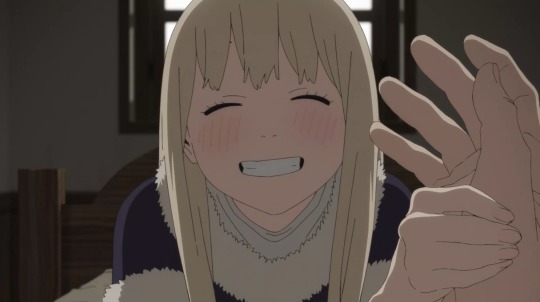
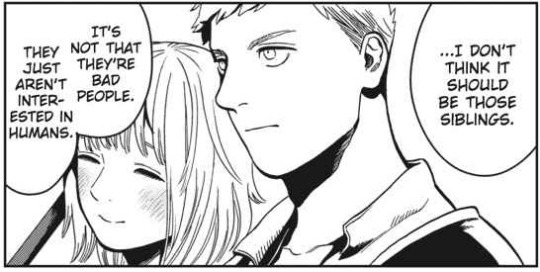
Been stewing on Falin thoughts for a while, I know I have an interpetation on her that differs from many but I’m jumping into the fray. I think there’s a lot to be said about what we do see of Falin. This shorter Falin analysis I made is heavily encouraged prior reading. This analysis mainly explores her complex relationship with caring and so it’s sort of structured in two halves, with Faligon at the crux of it all.
Falin cares too little :
A lot of people assign Falin a people pleasing mindset and I… Don’t agree. We never see her care at all about people in her town or at the academy not liking her.
We do see her worrying about what people think of her… ONCE. And Laios comforted her, told her they didn’t matter and she should be proud of herself. She latched onto that hard. That’s why this scene was so important to be included during the dragon fight, relationship-defining; it’s always been them against the world. She grew to not care what others thought, to only focus on her close loved ones. No one else matters.
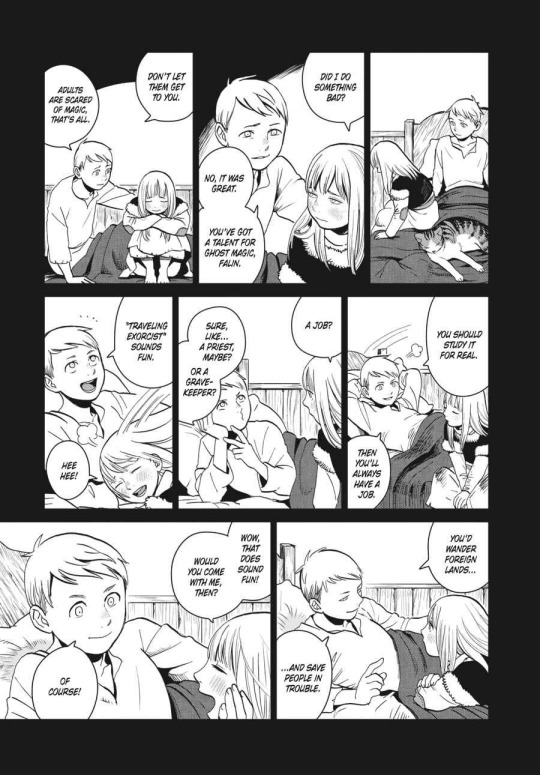
Laios’ words were her world. Her older brother who taught her how to feel comfortable with herself, who told her, you’re great, others are the ones in the wrong to not see that, I’ll always be with you, always be there for you. Older brother who always made great plans, who always knew more, who was better at wrestling to name the dogs, who she has always idolized. Laios who always spoke of traveling the world, to which she always said she wanted to follow. And she would, she’d follow him even if it meant leaving the academy and all she knew behind, she’d follow him to the ends of the world, and that’s what she did.
She didn’t care about showing to her classes or keeping up such appearances, she doesn’t even think of toning down her jumping into bushes when Marcille recoils, etc. She acts like an obedient pawn often, to her parent’s directives and then following Laios around no matter what he decides to do, but I don’t think the motivation is people pleasing, rather it’s being with & caring for her loved ones, and her go-with-the-flow attitude enhances the impression. Not that it’s as simple as that, mind you, but let’s talk about this for now.
Falin is perceived as selfless because we, the audience, have our perspectives revolving around the main people in her life (Laios, Marcille). They’re the ones she’s devoted to and people who care about her back a lot too, but to people like her classmates or the towspeople she probably must have seemed like someone who didn’t care about the people around her or her surroundings a lot, who just went on alone and did her own thing.
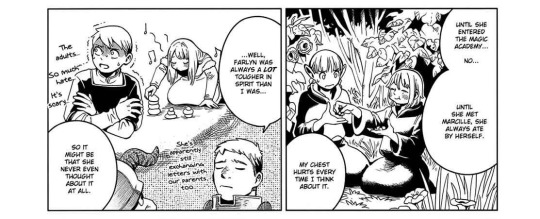
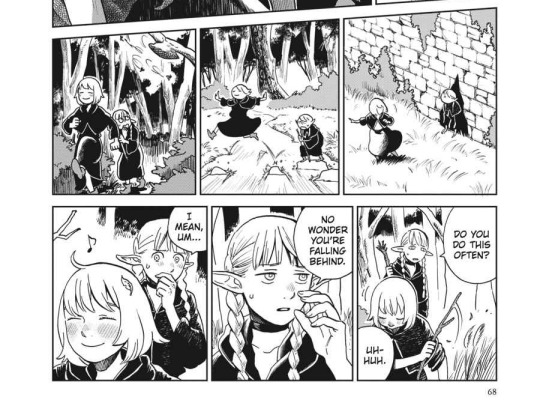
What matters to Falin? From what place does her kindness come from? Is a part of her keeping up appearances? And I think that’s the point, the horror of Faligon as well, that we can’t tell just how in control Falin the person is as the chimera (because we are shown that she’s in there, we just don’t know at what degree), that we don’t know her enough to be able to tell when she’s at her most genuine, her most raw. That even if you do settle on none of her being present as Faligon, we have to at least consider it, consider that she may be able to do something like this and have a part in it, brutal and uncaring. That even the lenses we see her through, the people who love her, may be unreliable.
And this is what’s very interesting about her too, she truly is so idealized by people around her as a saint. She’s so good and kind and caring to everyone etc etc etc. Laios, Toshiro and Marcille all see her as the paragon of goodness in the world. More cynical characters like Namari and Chilchuck have more layered opinions on her, the latter finding her somewhat unnerving because he can’t read her well. But then with that one flashback scene we see that… Her priorities are intensely focused on Laios and Marcille, she doesn’t care all that deeply about anyone other than them (+ maybe her parents). The rest of the party is in the same danger here but only Laios and Marcille who she’s speaking to get the special ,ention, and if they don’t cross her mind then of course she’d be ready to sacrifice strangers through a risky teleportation. That doesn’t make her not kind or caring!! Just that greater good isn’t exactly her priority. Any means is alright if the end result is her loved ones safe, it usually takes the form of healing and caring, but we see she’s ready to fight and make dangerous calls too. To me there’s this aspect to her that she isn’t as pure and magnanimous as everyone thinks she is, both in-world and interestingly enough meta wise as well, and there’s something interesting to that.
People pleasing implies a need to be liked, needs for the motivation to be that. A yes-man, etc. But if we analyze Falin, her general kind, smiling demeanor is more a matter of passivity I yhonk. Conflict avoidance is easier, so she’s friendly and hopefully things’ll be smooth sailing. It’s easy to be kind to classmates even if they act wary and rude if you don’t care about what they think either way. Of course she prefers good things happening to people over bad things, she is genuinely kind, but I think people tend to assign her a very grand altruistic way of life when to her the motivation is pretty self-centered. She doesn’t do what she does because she loves them, but because she loves them.
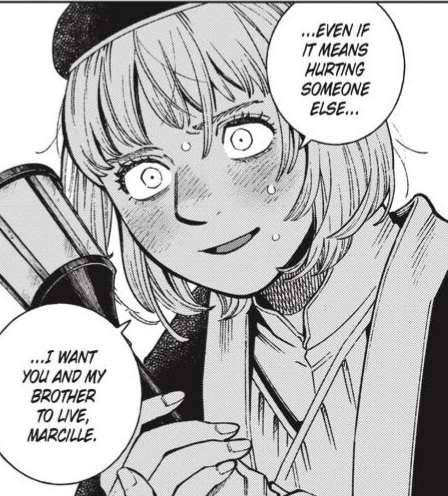
One situation that’s interesting to dig into for her way of thinking, and what I’m trying to get at, is Shuro’s proposal to her. I’ve seen people saying she hesitated because she didn’t feel comfortable saying no even though she wanted to, "I can’t say no, I don’t want to hurt him", something that sounds sensible and familiar, but it’s actually canon in the Adventurer’s Bible that the reverse was the case, that she didn’t feel comfortable saying yes. Because the offer was tempting, but it’d have been a loveless agreement on her end. And it makes sense she’d want to say yes too, like we see with the Toudens, marriage is very much a political strategical economical thing in their village, there’s even a bit on it on Laios’ Adventurer’s Bible profile about dowries, and both siblings were engaged very early. They lived poorly for a long time, it’s an enticing idea to marry rich, to have not only yours but your brother’s needs met forevermore easily, which at one point in their careers was their main worry and goal. Why shouldn’t she accept a life of leisure and wealth handed to her by a lovely friend?
So her hesitance was "yeah that’s convenient for me, but where it’s everything to him and heartfelt I’m able to be detached because I don’t care about it that much… Can I do that? I’m not reciprocating, not saying yes in the way that matters. Can I do that to him?" Very caring even though it’s not what you’d expect, isn’t it?
And central to my analysis, where I’m going with this is, I feel like that’s the thing with her character, that she doesn’t feel as strongly as she "should" sometimes, or feels a different way than she "should", or at least that she feels that way and others say she does. She didn’t mind suddenly leaving the academy, leaving Marcille behind and not seeing her for 4 years. She acted like it was no big deal that she sacrificed herself after getting resurrected after the red dragon fight. And in both those cases it upset the people around her greatly that she didn’t seem to get why it was such a big deal, didn’t seem to care about how they’d experienced her choices.
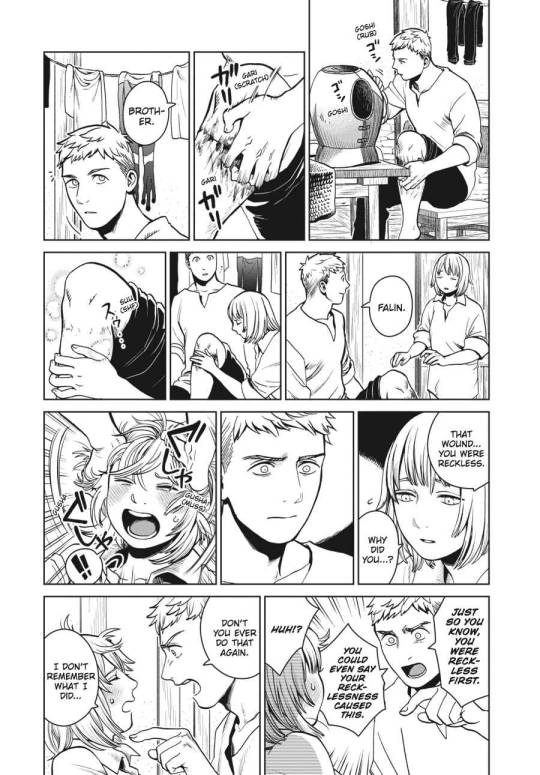
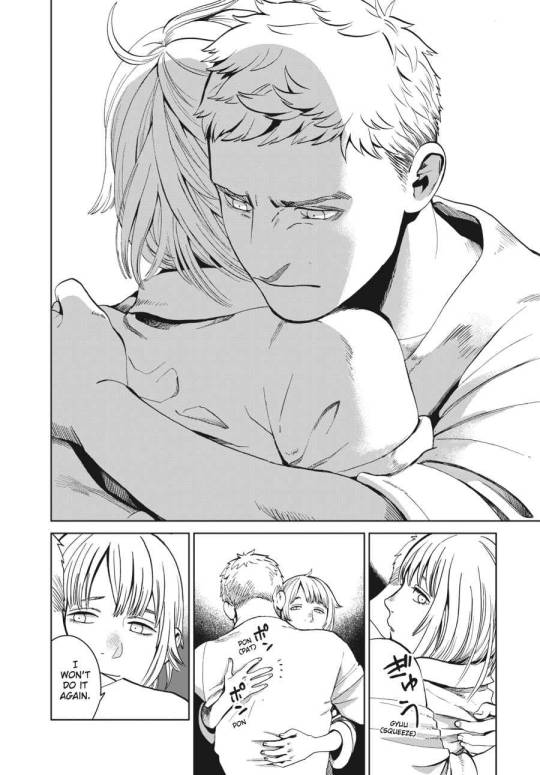
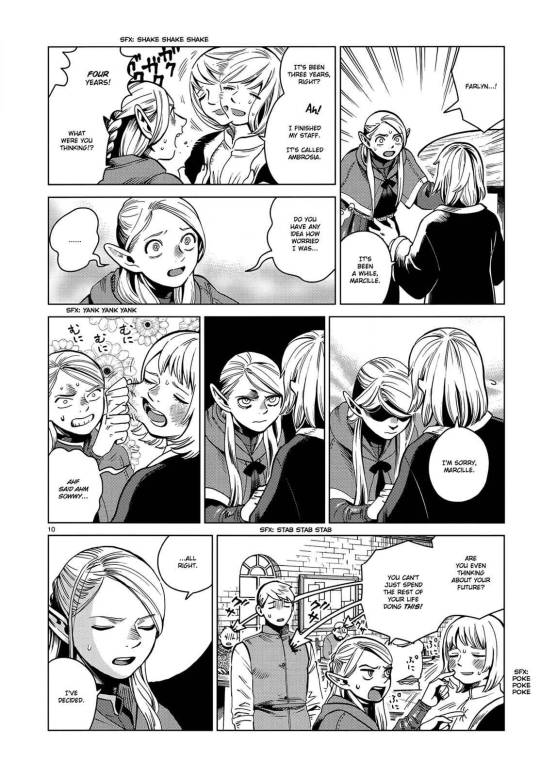
So it’s a tendency… And it’s not that she doesn’t care, it’s just that the way she measures what’s good for the ones she loves isn’t the same as what they themselves think it is (like Laios and Marcille not wanting to be apart from her). It’s an overt but quiet kind of care, it’s doing things like following them around and making sure they bathe and have a meal, even if that means she has to be dragged into misery too.
So yes she probably would know "not caring enough/the right way" is one of her perceived flaws, and that informs how she tries to handle her response to Shuro’s proposal. Her not wanting to accept like her first gut instinct, is because she’s thinking about reciprocity, about if it’d be right to go into this knowing that they have different priorities and she might not be able to keep up with the type and amount of emotions he wants/expects from her. And that’s a big part of her character isn’t it, having expectations pushed onto her. Her trying her best, but in her own way that may seem odd or even unfeeling. Not unlike when she exorcised the ghost as a kid too, unblinking and matter-of-factly, and not seeming to understand why people stared the way they did.
Even though she answered his proposal only post-canon, she’d been pondering it for a while even pre-canon and the Adventurer’s Bible explanation was released midstory, so I’m hesitant to assign her much growth about her hesitation and what I went on above, since she still didn’t react "right" with Laios after the red dragon fight (even if she apparently doesn’t remember sacrificing herself) and put herself in that situation in the first place. She hasn’t finished her arc on that flaw of hers is what I’m saying, she for sure still has it, but I certainly think her thoughts on Shuro’s proposal shows awareness, both of herself and social.
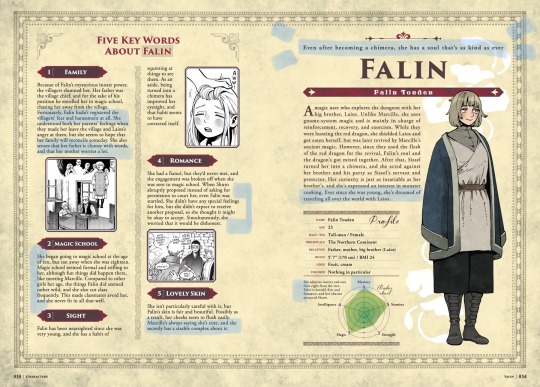
And awareness is a big analysis key word with Falin, especially here it can be hard not to conflate not caring with not knowing. How socially aware is she? It’s rather layered, because canonically she wasn’t aware of her ostracization in her hometown at all, and we’re not sure if she knew Shuro was interested in her before he proposed, but she generally seems more socially aware than Laios. She tags along on his caravan job to make sure he isn’t being mistreated (though doesn’t ask he get a salary), she catches social faux-pas more easily like in the genderbend magic mirror omake with Shuro, and interestingly enough she’s very good at empathizing with her parents and understanding their perspective. We see when she’s worried about Marcille coming that she does know about propriety and how appearances shape impressions. Being a chief’s daughter must at least have taught her a thing or two on that front.
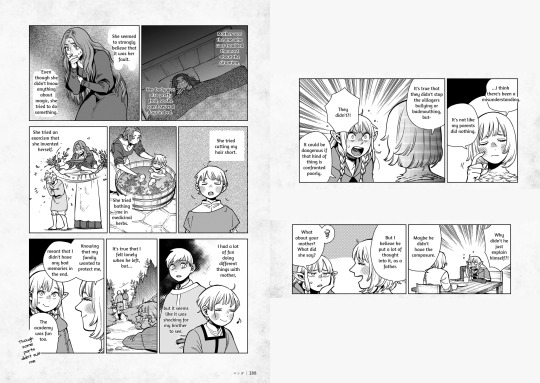
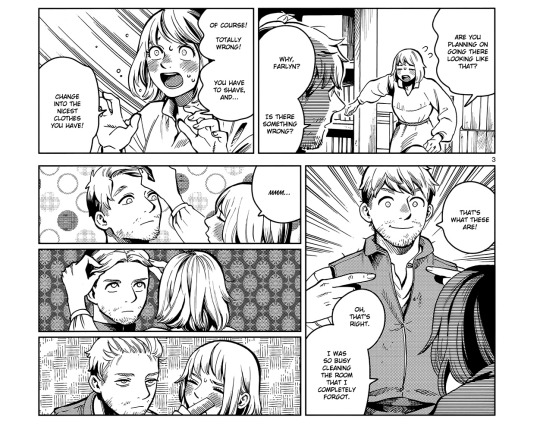
She never stands up for herself, but when it comes to defending others she worries, strategizes and explains.
And this sort of understanding is part of why I think she’d notice the expectations pushed onto her like I was saying earlier, notice how she makes people feel when she’s careless. But if she changes anything about herself in response to noticing is for her to choose, and generally I think it’s a sort of inbetween of yes and no: that she becomes more complacent but also more reserved, complying but by hiding more of herself passively. She’s not sure wether to accept or reject Shuro’s proposal, doesn’t want to lead him on? She’ll just be taking a while to silently consider it, try to keep things as they are for the time being. The third, less conflicting option. She doesn’t feel heard by Marcille who keeps infantilizing her? Just bear with it. Retract yourself emotionally. Settle for it.
We see that when she was young she had a tendency to not read a room, and I think that’s here too. She doesn’t get why her nonchalance upset others but that doesn’t change that she doesn’t want them upset or hurt, so she tries, albeit in maybe a roundabout way. She always had a hard time deeply connecting with people, often keeping herself some amount of emotionally distant: erasing herself from the equation, from the two-way trade that relationships are and making it a onesided thing instead, where all their needs and emotions are directed towards her but she only lets out a bit of her own show. She takes everything upon her and deals with it and tries not to give others this same burden, though not on a conscious level, it’s just that she’s learned growing up that she doesn’t have much agency.
Like I went into with my analysis linked at the beginning, I think Falin is used to just taking what she can get and not asking for more, when it comes to social bonds. She’ll take spending time with her mother no matter what it is they do, she’ll follow Laios to the graveyards and stick by him even when he’s pushing her away (because he doesn’t want her borrowing his book or "No copying!" or such). Her father was always distant, cold and uncommunicative, her mother was considered sick from anxiety and the exorcism attempts were the main way they spent time together, at dinner tables there were only her and Laios. The dogs picked on her too even if she loved them— And so did the townspeople, maybe that being normal to her at home is why she didn’t notice the ostracization she suffered.
She’s always been the last to be asked about decisions or what she wants, never asked to play with at recess, neither her father or Laios asked before sending her to the academy or leaving the village. At home, in the hierarchy she was considered to be below the dogs by the dogs themselves, as someone they can disrespect. Dogs learn from example and behavior, so this means Falin must have been pushed around a lot, and that the family didn’t try hard to rectify the dogs’ misconception, likely worsened by Laios regularly wrestling with her as a competition.
So for example when Falin showed Marcille food, it was her way to implicitly ask to have lunch with her without voicing that question, without daring to take up space. Someone’s presence isn’t something you ask for, it’s something that’s bestowed upon you, you can follow them around but you can’t ask them to stay or to come with.
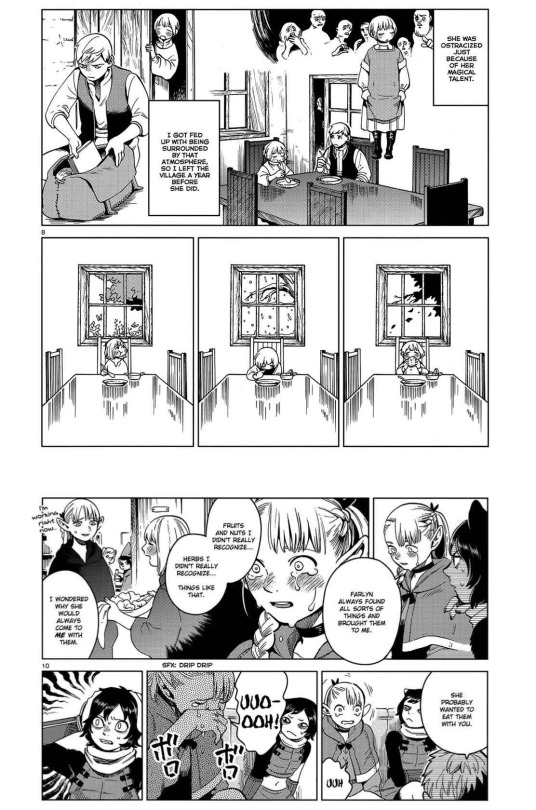
She’s used to her needs and wants not being listened to, so she’s learned to have less wants. Caring less about herself, caring less about other people beyond her safe zone, was a defense mechanism in part. She has a sense of learned helplessness too, like how when Marcille came to take her away from Laios, even though she didn’t want to leave with Marcille it felt so determined and unshakable to her that whatever Marcille decided Falin would have to comply with.
And still, it’s the "marrying you would be awfully convenient if it wasn’t that I’d feel guilty for not loving you back, the way you wanted me to when you proposed to me" and the "I don’t regret leaving the academy and leaving you behind without goodbyes but I’m sorry that you’re so much more upset about it than me". It’s the guilt of not loving people back the way they want to be, with the same intensity or fervor.
It’s the autism it’s the aroace of it all, it’s the emotional stunting and confusion but the pit in your stomach telling you you did something wrong again. The no object permanence even for people you love even for 4 years, it’s the feeling like you’re somehow at fault for someone having fallen for you and not knowing what to do with any of it. I’m not joking btw it isn’t uncommon for autistic people to not see their close friends for a long while, not having missed them all that much and for that to be really hurtful for the other if they notice/ask about it. "Hiii bestie! Oh umm you’re uh more emotional about this than I expected, hopefully you won’t feel alienated by me not feeling as intensely about it…"
So… Yeah. I think she thinks of things and relationships in a different way than most people, and beyond "good things happening to people is good" I don’t think she actually cares about people all that much. I’d argue that Laios shows more desire to connect with others and make relationships. And just like with Laios and his own issues with humans, that doesn’t mean her kindness is a lie or ungenuine or worthless! It just means that like, well it’s pretty straightforward really, she’s not all that social and doesn’t see casual bonds as meaning all that much and whatnot. She does want to see people happy, but it’s not as much like… A conviction or goal. She’s too laser focused on a select few people. "It’s not that they’re bad people, they just aren’t interested in humans."
And sometimes it feels like people get defensive about Falin in a meta way too, like if you ever so much as imply Marcille isn’t her whole world or that she isn’t the kindest soul out there then you’re saying she doesn’t care at all or she’s evil. And that’s actualy exactly the sort of vibe I wanted to get through with my analysis above here actually haha, that she does care and she is kind but it’s not in a way that’s quantified or understood in a way that makes people feel comfortable. In a way, that makes people feel insecure because they don’t have the same logic as her, don’t show love the same. And I think this is another stellar depiction of autism, of parts of it that feels unpalatable to many, if I’m making sense. The fandom idealizes her as well, which isn’t uncommon or surprising for the character embodying the trope of the perfect beloved to rescue.
And disclaimer, as I said in the tags I feel like the details of Falin are pretty vibe based when it comes to analysis, there’s absolutely a valid angle where she does super care about everyone always, feel free to disagree with me on the overarching angle of my analysis. There’s enough supporting evidence to tip the balance either way I think, and the reason I’ve chosen this angle is I feel it’s more compelling for the themes in Dunmeshi of idealization and being different, of desires vs wants, and because I think it neatly ties up Falin’s character arc as I’ll go over throughout the next section…
So.
Not feeling as much as she should. And……. Is this not Faligon pushed to the max?
You can’t tie down a dragon. As the chimera, she gets to just not care about everyone else and be on her merry way.
Part of it I think is finding comfort and freedom in the mindlessness, in not having the burden of feelings and connections and a consciousness (despite still ending up seeking those in a stranger, Thistle). Like when she’s dead in the purgatory as well, she gets to just… Hang around and do whatever. Similarly to when she played in the forest instead of going to class in her academy days. That’s what freedom and peace of mind looks like to her. Why she decides to roam post-canon, if only now with the goal to find herself instead, with her mind in tow and somewhere to go back home to.
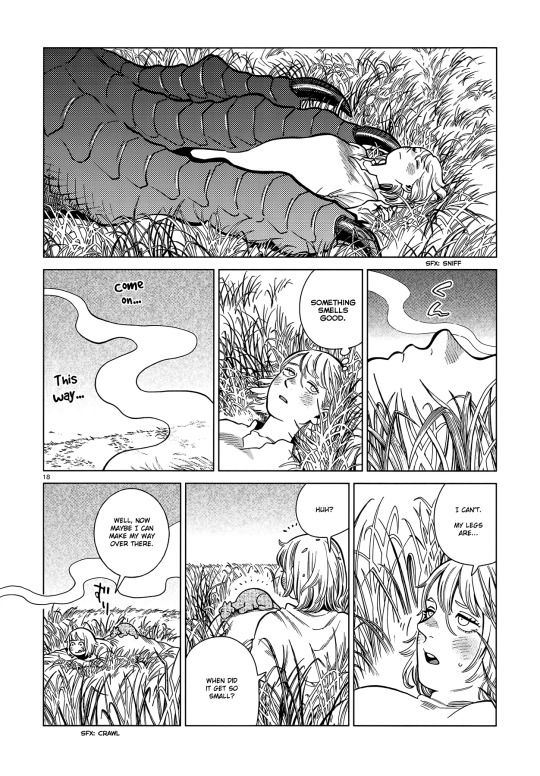
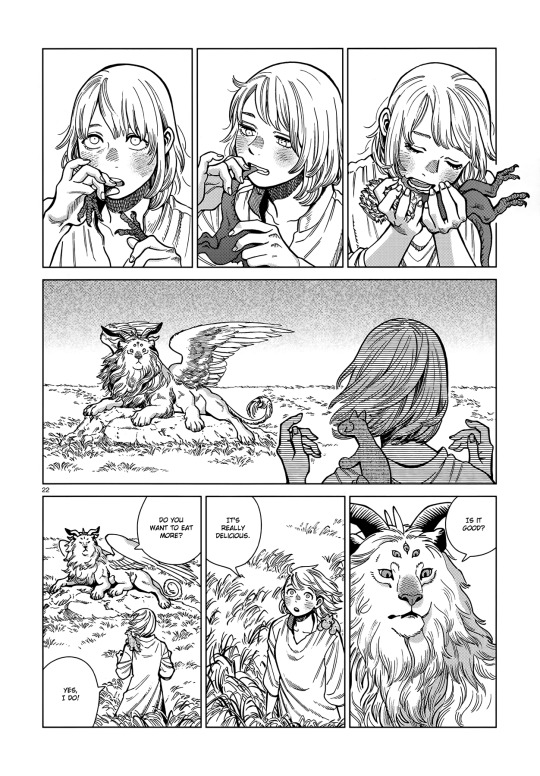
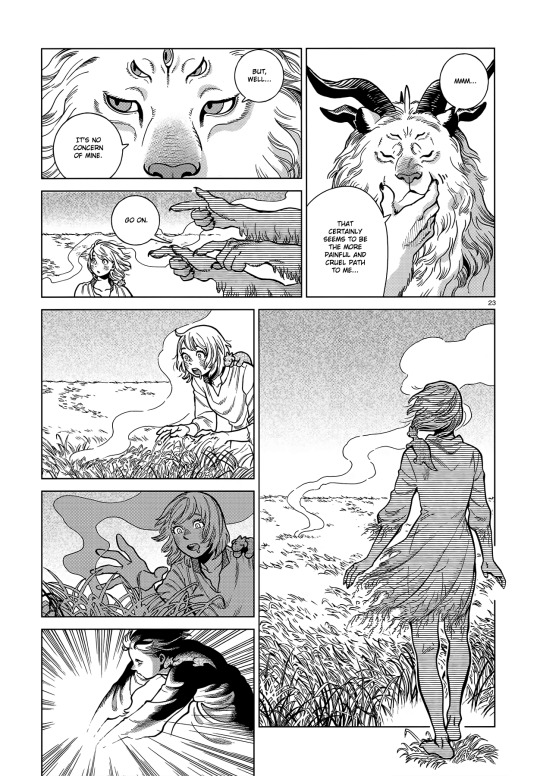
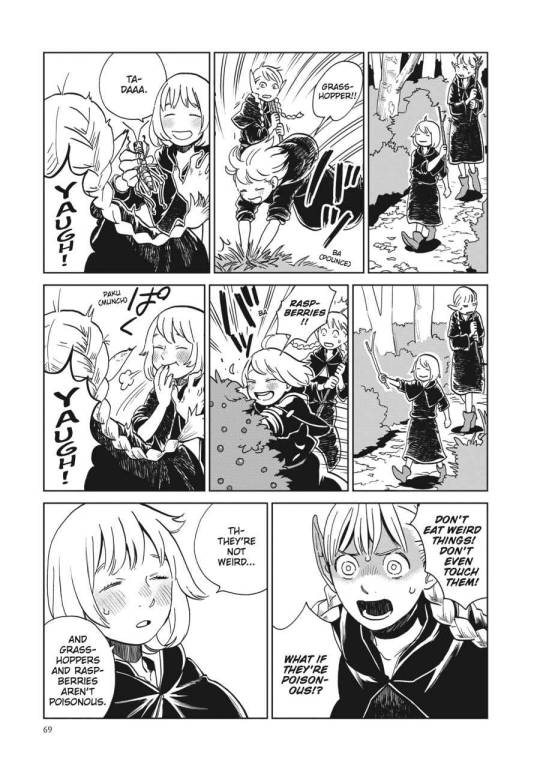
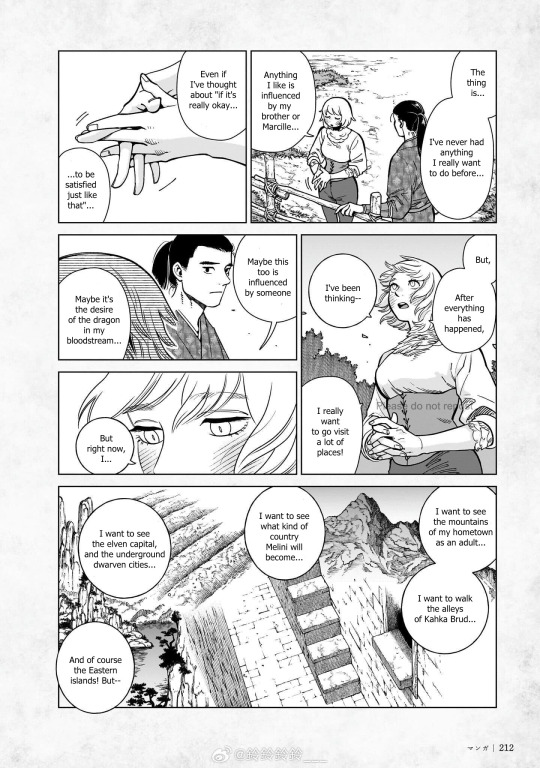
There’s excellent analytic framing out there about how of course, Dungeon Meshi has a big theme of grief and letting go, and… Falin was always a symbol narratively, idealized by characters and often underconsidered by them despite their love. It was Falin’s choice to sacrifice herself for Laios, she thought it was worth it, knowing that it would be her end. Her resurrection and the process of it intertwining her soul with a dragon’s wasn’t done with her consent, and the subsequent opening it gave her to become a chimera puppet. She’s stripped of her agency consistently, and so… It’s very noteworthy that the final choice, of wether to go back to life or to stay dead, in that purgatory scene, was up to her. And she chooses life, but I do think about her in those fields and how at home she seemed there. Peaceful, by herself in a vast calm expanse she could explore, free.
Personally, I think freedom is Falin’s own subconscious selfish desire. And though to us becoming the chimera is obviously a shackle, I think it felt like freedom to her somewhat, too.
And if you think I’m going wildly off the rails here I want to talk about Laios’ wish of becoming a monster. And to be clear before getting into it, being mentally a monster is absolutely a big part of the appeal for Laios, it’s something that’s consistently referred to, something especially pointed out in the werewolf monster tidbit with Lycion. Right panel is from that, but left panel is from the extra with Izutsumi where Lycion talks about suppressing souls in a beastkin body, the human or the beast soul.
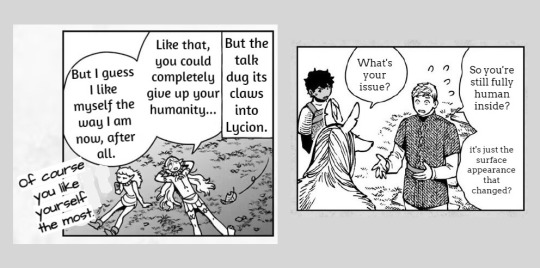
Finding comfort and freedom in being mindless, less sentient, less aware? While being unaware in her hometown might have saved Falin a lot of heartache although perhaps stunted her emotional growth, it’s always been Laios’ curse.
Actively, through his choices, he seeks to grow closer to people, to form deeper bonds, to understand and be undertood, but… On a deep seated level, what he desires is to leave humanity and civilization behind. He has an irrational hatred for humans, born from the trauma of ostracization, being different, being beaten up and rejected consistently through his life. Running away from problems is easier. He wants to be free from being a social animal from a social species who has deemed him the black sheep, he thinks it’d be simpler to just leave it all behind, people and his own humanity. At its core, to Laios becoming a monster is a power fantasy, a coping daydream of "if only I could be strong enough to never be hurt again, the power to destroy anything I want, the power to go somewhere better, if only it was possible for me to never feel hurt again. If only I could be someone, something, that can never be hurt". "If there’s someone you don’t like, you can gobble ‘em up in one bite. If you could fly, you’d be able to leave this village right now." It’s a childhood fantasy, from a deep sense of being misplaced and a desire to be able to stand fearless, thinly covering up resentment that Laios represses.
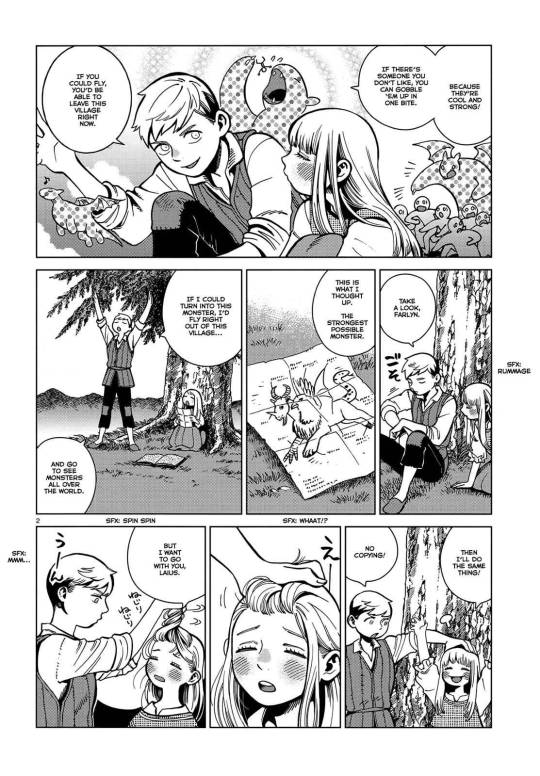
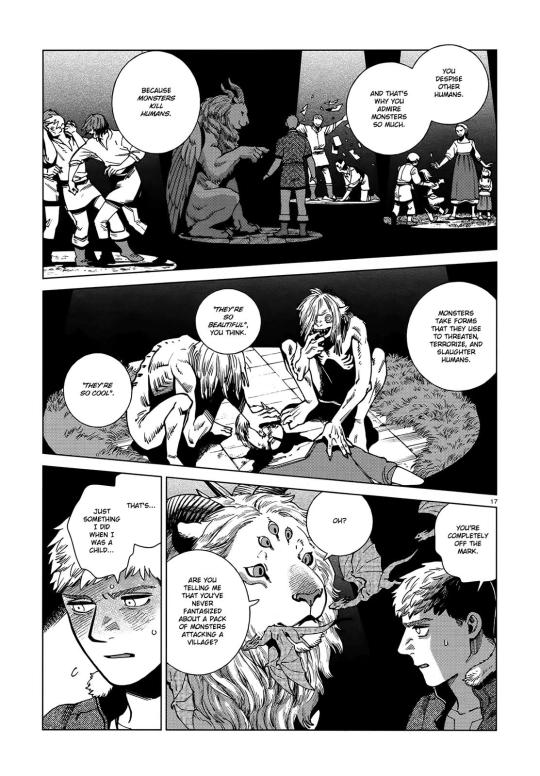
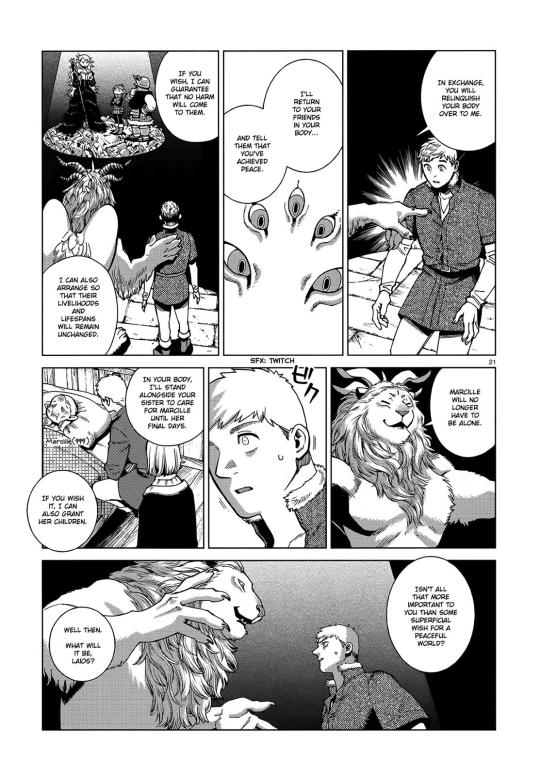
But you’ll notice, when the Winged Lion is enticing him in the last page, even now with his lifelong wish of becoming a monster on a silver plate, he still cares about his friends. He still has that sense of responsibility to his friends, doesn’t want to leave knowing they’ll be in danger and alone. The offer that his friends may be left unharmed is already good, but Laios also visibly flinches when the Winged Lion offers to specifically care after Marcille and rid her of her biggest fear. Laios’ care runs that deep. Not unlike with the succubus, he resists temptation until he gets reassured that everyone will be okay. But see, what he desires isn’t to stand alongside Marcille until her last days, it isn’t to stay and see how well his friends will live, it’s to go. It’s to leave. It’s to fly away, a monster both in body and mind. He wants to be free from caring here, wants to not have to worry about his friends, wants to just go do his own thing, but for that he needs to feel safe in the belief that said friends will be safe even without him being there to see it, because despite everything else he cares, he does. It’s again that dichotomy about caring and wishing you didn’t, or not caring and wishing you did.
In the end, it’s Falin who achieves that wish. Both by becoming a chimera during canon, and by going traveling post-canon. In the latter, being both free of human relationships as something chaining you while still being uplifted by them, by the knowledge that there are people out there you love and that love you. It’s a theme that can also be connected with Marcille, because she gets anxious over people she loves getting out of her sight, worrying they’ll get themselves killed, that time is passing while they’re away from her. But before she can get to the point where she can both have her freedom and being uplifted by her social bonds, regaining both her individuality and her connections, she has to get a taste of just one at a time. Before they can find balance in her life, she has to see what it’s like to have what she’s never had on its own. Unapologetic freedom, and power.
No one can blame you for not caring enough or caring right if you’re a fricking dragon!!!! You make the rules when you’re a beast and you can just… Fly away. From anywhere, from anything. And if a dog bites you you can just crush it. Instead of being pushed around by the dogs because you’re at the bottom of the hierarchy, you’re now at the top, the one with the power to be heard and do what you want without consequences.
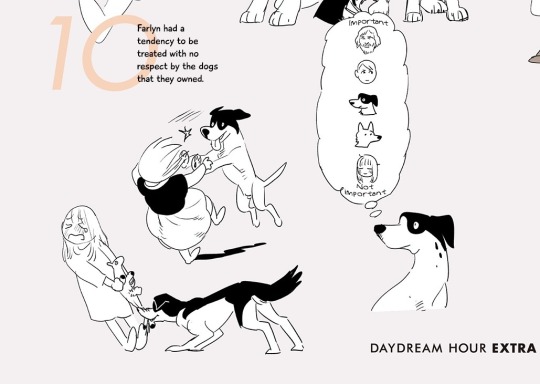
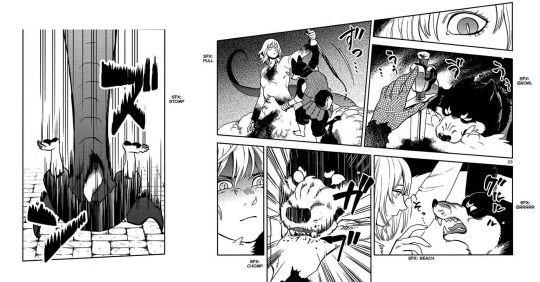
I think she’s on autopilot. I think she’s on autopilot a lot of the time, even before being a chimera, and it’s partly why her will is so weak compared to regular dragons. (Again, read my shorter analysis.) It’s familiar to slip back into the role of following someone around unquestioningly. And that’s what is weaponized when she’s a chimera, that instinct she’s been nursing all her life to unconditionally support, defend and follow someone. Only now, that someone doesn’t matter in itself, only the symbol of it. She doesn’t mind, either way is fine. Her will is weak after all, because she’s trained it to take as little place as it could.
Falin cares too much
She spends all her time caring for Laios and Marcille alternating that none of her care and emotional energy is left for others, including herself. So she had to get relieved of all of that for a bit, becoming the chimera so she could reset and recenter and remember that she, too, indeed, is there and an important part of her own life.
So you’re probably seeing the duality I’m talking about here, Falin is very self-sacrificial but for specific people in ways that they often don’t recognize or appreciate. She cares but selectively, both in people, putting all her eggs in the same baskets, and in the ways she cares after them. She doesn’t care a lot, but when she does she cares a lot. Falin doesn't have a lot of earthly attachments, but when she does, they're her world.
In canon her arc, especially post-canon, is to grow beyond Marcille and Laios. Her caring for her close loved ones held her back from looking after her own self-fulfillment needs. And this is what I mean when I say she cares too much; she could gain from caring more about the world besides Laios and Marcille, both lands wise and people wise. She cares too little, but her arc centers her flaw around caring too much instead. Her pitfalls that Kui highlight over the course of the story, while of course her selflessness is appreciated for how she saved Laios and everyone, on a personal level is shown to be self-effacing and damaging. She’s undermined by Marcille, without the courage to voice her thoughts and wants, she would dedicate her whole life to Laios. And I mean, it’s text, in the response to Shuro’s proposal extra no less. And she’s so laser focused on her most loved people that she’s fine with being callous and risking others’ lives, even.
Post-canon, she needs to leave to find herself, away from them.
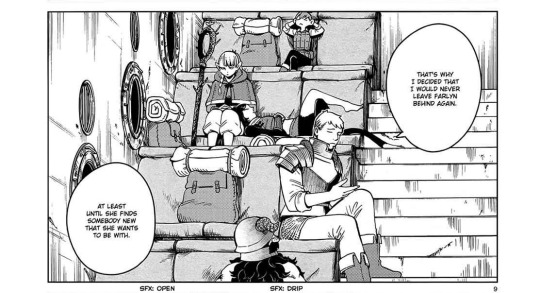
Herself. What if she wants to just be with herself for a while.
And this is me reaching but I feel like, not unlike Izutsumi who learns to feel this sense of never being alone, always having someone on your side what with having two souls, the dragon in her would make her consider herself more. She finds it easier to care after other people after all, and in the purgatory fields sequence she takes care to bring the bit of dragon left with her… Not unlike with Izutsumi, having two souls forces you to think about your identity and figure yourself out. Besides being this sort of duo now, where if she wants to care after herself she can channel it to that other side of her too… In meta dragons are symbols of greed, and I think the bit of dragon would push her to want more and listen more to her desires, primal and self-serving as they might be. The dragon soul which warped her human body with feathers and draconic features, her image of perfection marred, her weirdness externalized in a way that’s not palatable. But she doesn’t care, about if her appearance is palatable for most people, she hasn’t for a while now, and that’s great.
Notes & nuance
I’m struggling with the structure of this post, making my points organized, concise and strong at once. It’s difficult to make any statement without going "things are generally like this, but there’s this time that this contradicting thing happened too" or "it’s ambiguous enough that you should just follow my interpretation for the time of this analysis" haha, so this is the pit where I put all the stuff that wouldn’t fit well in other places but are interesting for Falin’s character. This section is pretty separate from the main thesis of the post, it’s just more Falin observations. The post has reached the 30 pics limit so I can’t just pull it up whenever it’s relevant but I really encourage scrolling up to read the stuff I highlighted in her Adventurer’s Bible profile if you haven’t already.
I think with the shy-looking loner type autistic kid archetype, and knowing she didn’t seem to mind others ostracizing her, it’s easy to lose sight of how she was by no means an unemotional child. In all the bits we see of her as a kid she’s bursting with energy and emotions. Canon confirms Laios leaving the village did affect her and make her lonely and she cried a lot, too. She may not be social in the traditional sense, but she was clingy with her brother, and she also never was all that shy about who she was, wearing her heart on her sleeve.And okay. Okay okay okay. Speaking of appearances. About what I said of her not caring about what people think of her, even seeming defiant with the caravan leader… There’s one istanxe of her caring actually, and it’s about how her face blushes easily. I remembered it as being because Laios’ said it and as I rambled Laios’ words are her world, but actually it’s ambiguous. It’s only Marcille imagining up this scenario where Laios says Falin looks weird because of it, there’s no evidence Laios said or thought that at any point. And on the other hand…
Her Adventurer’s Bible says: "5, Lovely Skin. She isn't particularly careful with it, but Falin's skin is fair and beautiful. Possibly as a result, her cheeks seem to flush easily. Marcille's always saying she's cute, and she secretly has a sizable complex about it." The phrasing makes me think the complex she has over her blushing might have developed because of Marcille more than Laios. "Marcille's always saying she's cute, and she secretly has a sizable complex about it." It could be related to how Marcille gets swept away and infantilizes her, calling her cute wanting her to wear cute feminine outfits etc. Again this feels like it relates to Falin’s struggle to be seen for who she is and what she wants to be seen as, her struggle to be recognized, having ideals and perspectives pushed onto her. Here Falin is insecure over her blushing implicitly because she doesn’t like being called cute over it, but that’s not how she wants people to see her. She doesn’t want Marcille to always see her as her 10 years old adorable friend. Like if your friend said you had puppy energy, it can be flattering, but it can also make you insecure.
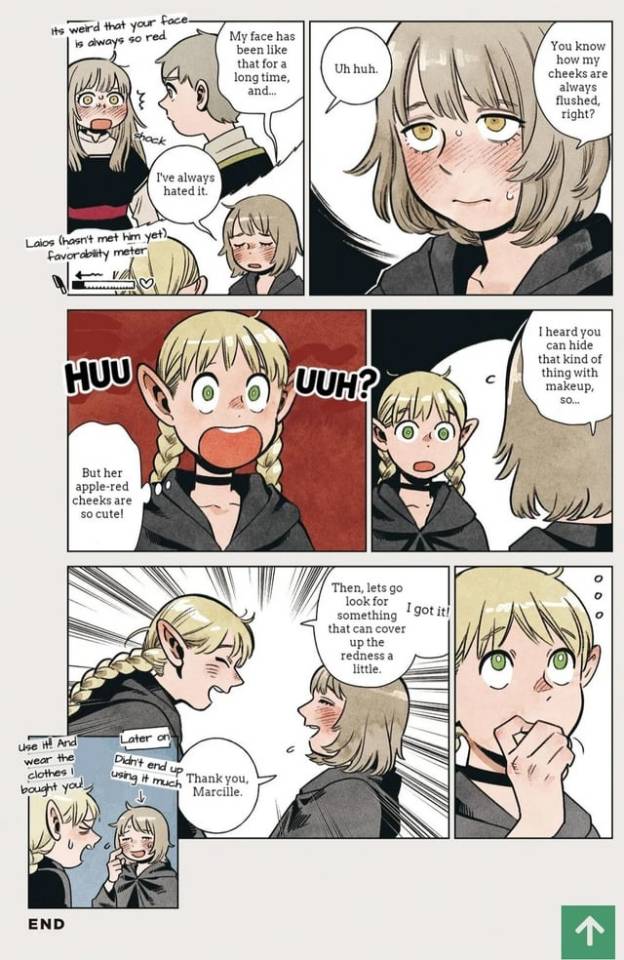
Here’s a link to what I mentioned about her being uncomfortable wearing feminine outfits. It does seem to be more about comfort than the aesthetic perse, to me. Interestingly the shirt & shorts don’t seem like they show much more skin than her beach outfit, so maybe it’s more about the shirt and shorts being tight-fitting. Like the skirts and heels they feel stifling. Again a bit with themes of freedom and not wanting an aesthetic pushed onto her. So yes just to reiterate, I think this is more about self-affirmation and how her identity and self-image gets shown to others, rather than wishing to hide parts of her body like her blushing etc for people pleasing reasons. Makeup was a way for her to appear how she wants to and feel more confident. It was a way to take control over her own image. She didn’t keep doing it, the narrator stating the process to be ‘troublesome’. Ultimately she still prioritizes her comfort, and it was a lot of recurring efforts to go through.
And on the topic of appearances… A friend once asked me: "Does she really hide herself or not? I keep thinking about "falin is herself first and foremost" (in her Adventurer’s Bible profile) it’s just so. Hmmmmmmmm... I just keep seeing people say she hides her real self from people when I feel like the issue is more about her charitable traits straying too far into becoming flaws but people around her dont realize that..."
Imo the thing is, I don’t think she hides her identity, but I do think she suppresses her individuality for others’ sakes if that makes sense. In the way that only post-canon does she allows herself to go see what the world is like, but that’s not personality wise it’s needs and wants wise. And I do feel like that’s the closest interpretation of canon, she says it herself she doesn’t know what she wants because everything she’s done was always about Laios or Marcille, but she doesn’t change her demeanor or personality for others. But she *will*, like, not ask for things she wants directly, like sharing lunches with Marcille at the academy, she suppresses her wants, doesn’t ask things from people and doesn’t hope for more, hope for better. I don’t think we ever see her actively repress her personality, except like what, being more laidback than enthusiastic but I do feel like unlike Laios with her it’s less ‘appearing stoic to fit in more’ and more ‘yeah i’ll just chill until I’m needed or something activates my enthusiasm’. To which said friend quoted: "to feel like you belong you need to be useful. when you can’t be useful the next best thing is being convenient."
And speaking of passivity… I want to speculate about Shuro’s proposal some more. Shuro and her got along well though we don’t know how much, or how often they hung out, she even saved him from a nightmare. Why did she take so long answering Shuro’s proposal? Was it an effort to preserve or was she really just that conflicted? Procrastination probably yes, but what is the core motivation of itl Considering she ended up saying no to travel the world instead, I don’t think it was as simple as ‘she wanted to say yes for convenience’. Logically it’s what would have been best, but it’s not what she wanted for herself, but it was and still is hard for her to even know what she wants. Probably, since like she states it was a great offer and she doesn’t think she’ll get proposed to again, it’s that self-effacing tendency that yes it’d be convenient and logical, and that makes her want to say yes even if her spirit isn’t in it, because if it’s convenient then that’s more important than her feelings on the matter. Man also… Obviously Marcille is very vocal about how she shouldn’t get with Shuro, but imagine how Falin’s whole perspective on marriage must have felt when her only friend ever is a Romantic with a capital R who gushes about idealized romances and grand gestures and True Love and doing things with fully pure feelings all the time.
AND speaking of passivity!!! How much Falin is "there" as the chimera, just how much she’s master of her actions, is left ambiguous and intentionally so imo, but she’s for sure there & influencing the dragon’s action to some degree. Having a dragon’s foot on her in purgatory that keeps her from moving for sure visualizes how it must have been like, but there’s Falin calling out to her brother Laios, there’s the kind attentions towards Thistle that are so Falin-like, and most explicitly there’s the Adventurer’s Bible stating "Even after becoming a chimera, she has a soul that's as kind as ever", which I honestly dislike, a fantranslation puts it as "Even as the chimera, her caring nature remains" and either way to me it feels like confirmation that it’s her giving those berries to Thistle. Now, wether or not she has the mental capacity of a chicken or something closer to human Falin, no clue, there has to at least be some kind of mind bond between monsters and the dungeon lord, compelling or forcing them to go along with orders, or calling her to him in distress like with the fight on the first floor. But yes, it’s interesting to wonder what it is that a Falin, with her kind soul but without her human mind, would willingly do. On her profile, she’s described as Thistle’s guardian and servant. The power dynamic between the two are very interesting, I already went into how it might have felt like freedom to her while being fake so I’ll reign myself in and just mention it again. She’s still at the heel of someone, only now it’s someone who doesn’t care about her back. Going from being cared for so strongly that it’s suffocating and they would defy death and the world for you, to being devoted to someone who has not one feeling about you besides your utility as a paw . She has all this care to give and to focus onto others and he has none to send back to her and I think that’s part of it. In a way, being left with only her own feelings and a void, without expectations or feelings or ideals pushed onto her, it might have been soothing in itself, and eye opening. But yes the way I think of it, her care for Thistle isn’t unlike the care she gives the ghosts.
Interestingly, the care she extends for the ghosts is sending their soul to a peaceful death, freeing them, of life and any earthly attachment. Take that as you will with the themes of freedom and burden of life and mind, immortality and becoming a warped version of who you were, and such and such.
But going back on the topic of connections and bonds for a bit, I think academy days Falin & Marcille is super interesting bc we’ve never really see Falin form a connection besides with Marcille and even that is kept pretty ambiguous. When was the point that Falin started seeing Marcille as a friend and seeking her out? When was the "I’ll lay down my life for you" point? I’m so fascinated by how she wanted to share lunches with Marcille but never truly asked, only made little "hey want this? I found it isn’t it cool?" gestures of showing things to her… It’s the only way she knows to ask, or maybe it’s the only way she feels comfortable to. In all the scenes of young Falin and Marcille Falin seems comfortable in her friendship with Marcille, but at the same time… I think we see Falin at her most insecure around Marcille, because she really does care about Marcille and what she thinks of her so much, and while Marcille is a bit of an unstoppable force tornado style (affectionate) Falin is something of a doormat. I’d usually say showing her berries was her earnest way to connect and be like "Hey bestie look at this! :]" , but there’s a real possibility that she was self-conscious and holding herself back.
Friendship and Marcille! Involving Laios into this too but, again with the autism thing of not showing you care in ways that others understand, Marcille being very overtly affectionate and clingy was so so soo important… Marcille keeping on hanging out with Falin and caring after her, and being undeterred/unbothered by Falin not always seeming like she cares all that much back in the conventional way, as in Falin acts nonchalant and a bit like she didn’t mind wether she was there with her or not during her outings to the cave dungeon. Caring and being clingy and so affectionate despite that in such a classic Marcille way is soo needed, because so often people will get discouraged by say, their friend not keeping in contact regularly/well, seeming disaffected or as happy-go-lucky as ever even if you haven’t seen each other in a while or when they’re alone, and yes there’s potential for a strong friendship there but someone like Falin won’t be committed enough to reciprocating attention the same way… I hope I’m making sense but yes this angle in particular strongly correlates to autism. And the way Marcille always initiates physical affection, both Toudens being awkward about initiating touch because they don’t know if that’s allowed, if they’re going about the social interaction the right way, if they’re allowed to ask that out of someone…
Another fun observation to make is about the 4 years Falin and Marcille spent apart. Marcille despite being of a long-lived race treated these 4 years of separation with more gravity than Falin did. Falin brushed it off very dismissively to say the least. But then you remember that the amount of time Falin and Laios didn’t see each other after he left the village was 8 years. Double the years, double the time. And that reminder makes Falin’s actions so starkingly understandable. Of course she wouldn’t see 4 years of separation as a long time if 8 years of separation with her beloved brother is her point of comparison. Of course she’d see it as worth it to leave Marcille for 4 years if it meant ending those 8 years instead, especially if she was worried about him (the reason why she followed him into his caravan job).
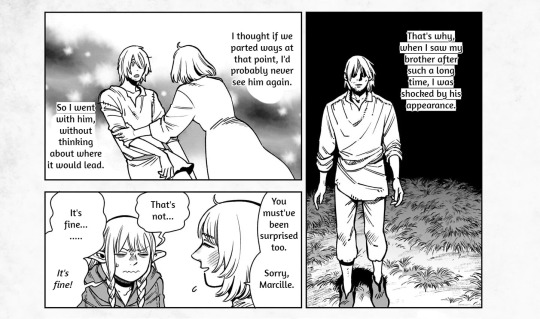
A friend always says that while Falin is the center of Marcille’s world, Laios’ is at the center of Falin’s, and I tend to agree.
It’s fun to think of how her career dreams had always been shaped by Laios, even when they were kids. Of course there’s how traveling the world began as a dream they talked about and shared, but there’s how he reassures her by listing cool jobs she could do like traveling exorcist, etc. And then of course, she gave up on her magic academy and career path to follow him and do odd jobs, etc etc.
I should go into the violence of Faligon more tbh, because I think there’s an interesting parallel to how she has no problem wacking things with a mace, wether a ghost when she was a kid or a walking mushroom as an adult. Something that often surprises fans when they remember, I don’t really want to get into the whole " Falin hates violence and hates seeing people in pain to an intense degree. ‘If you die do it somewhere where I can’t see’ style’ interpretation, it has some weight but on the whole I don’t vibe with the theory she has a particular aversion to violence, she seems to be fine resorting to it as much as any other adventurer as long as it isn’t needlessly against ghosts. And Falin’s sudden mace hits are fun to me too because it’s not her becoming a berserker when the need arises as much as her becoming active because something she cares about is threatened, and that brings her out of her passivity from 99% of the rest of the time. Thistle included. Falin always could be violent, she just dislikes senseless carnage. The Shuro party vs chimera fight is a bit ambiguous on it, because you can argue she only attached after being provoked, presumably offscreen as well while the ninjas went off to fight the harpies. Falin becomes the most active when she needs to protect someone, she has no qualms doing whatever’s needed for that, wether it be leaving the academy & Marcille without notice no matter the consequences or what her parents think, or teleporting the party, etc.
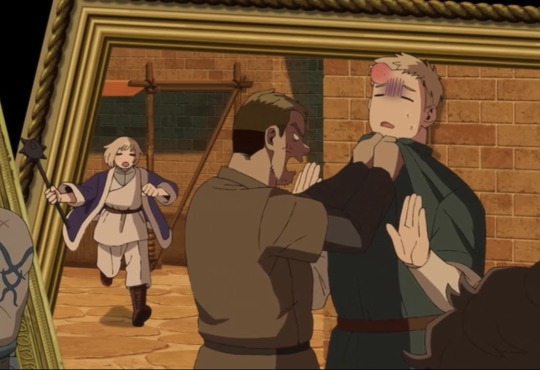
I’m working on a post specifically pointing out all the differences between Falin and Laios, but yes I think both of them selfishly desire freedom in different yet similar ways. Falin’s dark secret is "Ethics and risks are optional if it means I can protect those I love" like the teleportation, and Laios’ is "Ethics and risks are optional if I can be free of all this bullshit" aka humanity aka his wish with the winged lion.
Conclusion
Flighted birds have hollow bones. With freedom and wings there comes risks and sacrifices.
Tldr: Falin doesn’t care all that much, she’s very go with the flow. For example if someone hates her she doesn’t really care because that’d require her caring about what they think of her in the first place, and she only cares about her loved ones. She smiles, but it’s more a state of being rather than out of active goodness: she’s canonically very genuinely kind, but it’s more out of a general want for pleasantness than active care itself. She’s passive, and softspoken because that’s just how she seems, but she has no problem hopping into bushes or getting heated if something calls to her enthusiasm or calls for action and a hit of the ol’ mace. Her loved ones needing tending or protective is what makes her go from passive to active. That familiar autopilot mode of making someone the center of her world and following their every move is what made her so easy to be controlled as the chimera, even ferociously defending him with her life. Faligon is most interesting to me with the theme of freedom. She’s shackled to Thistle and out of her mind, but there’s also a sense of empowerment and freedom from expectations and society. She spends all her time caring for Laios and Marcille alternating that none of her care and emotional energy is left for others, including herself. So she had to get relieved of all of that for a bit, becoming the chimera so she could reset and recenter and remember that she, too, indeed, is there and an important part of her own life. There’s a way of caring after others that can be selfish, not unlike Marcille being overly coddling and not listening to Falin. In Falin’s case, I think it was so selfless that it ended up looping back around to erasing her sense of self. In losing sight of herself, that devotion becoming neither quite selfish or selfless but a fact of life and a state of nature, muddled by its lack of direction.
She’s sooo used to never being able to ask things out of others, you get the crumbs of affection and approval that others offer to you unprompted and that’s it don’t hope for more don’t ask for more. (Also reflected in how she follows her loved ones around without complain or personal opinions and how she’s not willing to rock the boat and affirm herself in her relationships like with Marcille during canon)
Falin cares so much, so much and so laser focused on her few loved ones that it blinds her and she loses sight of everything else, she ends up neglecting herself and the rest of the world. As Kui puts it, Falin is herself first and foremost. She just had to remember the importance of that.
-
I see her as an enneagram 9, which can be surprisingly accurate and fun to research through the lense of Falin. Excerpt below from this book, but like my god, good way to put it
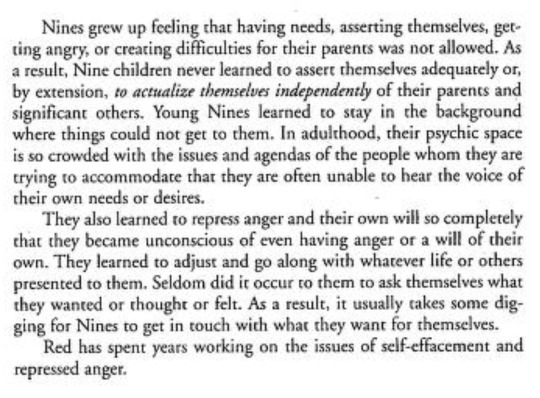
That’s it, ty for reading. Even if it’s a bit of a mess, hopefully you’ll have gained a thing or two from it. Falin is a character hard to pin down, but it is very gratifying when you find the way that the puzzle pieces fit together right for your own understanding of the story. Fantranslation of the shuro proposal comic by @/thatsmimi here.
Here’s my spotify playlist for her if you’d like
Sometimes love is about letting go, a lesson a lot of the cast needed to learn. Self-love’s important too, and just like with diets we need a healthy balance.
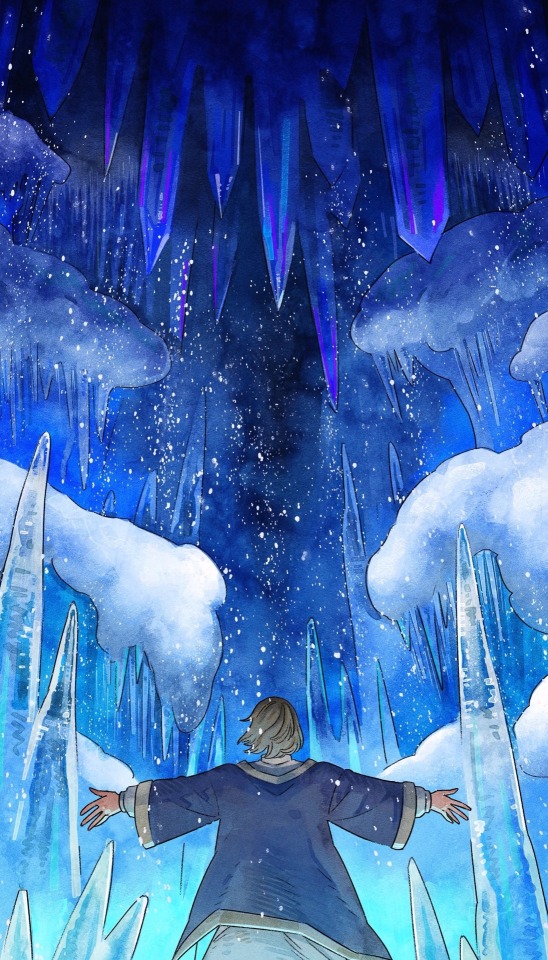
#I find it hard to express myself right on the topic of Falin. Both because the issue is pretty vibe based and because we don’t#get that many moments with her. So there’s ambiguous scenes up to interpretation addressing a layered topic and like. Save me. Save me#As always falling down the rabbithole of starting an analysis about a specific facet and then needing to explain everything else around it#I’m doomed. I’m getting lost in the sauce.#dungeon meshi#delicious in dungeon#falin touden#analysis#character analysis#meta#autistic reading#aroace reading as well. Sort of. It’s mentioned#The aroace autistic guilt of not caring back in the way/with the intensity you’re expected to#As always this is just my interpretation blablabla#Spoilers#dungeon meshi manga spoilers#She loves like a dog aka unconditionally and happy with eating scraps of affection and attention off the floor#Laios touden#he’s here too bc they are an unit#If you’re not capitalizing on the uncanny vibe autistic effect for Falin’s character u are missing an opportunity imo#Fairy’s child is written all over her. Her cryptic-ness is the point so why am I surprised she’s hard to fully pin down#Even with the graveyard scene it was Falin following Laios… Sob. Laios could feel responsible her powers were found out#I’d like to rework this at some point if i get better at structuring. I’m not satisfied by the level of clarity#Will 90% for sure edit stuff in if i find more to say.#Fumi rambles#Crazy style#I give a TLDR at the end if you’d prefer. It doesn’t have the like evidence/explanations alongside but it makes the main points i think
1K notes
·
View notes
Text
The best part about coming back to the source material after a looooong time is you sorta get a fresh look at canon in comparison to whatever the dominant strains of fanon have become. Or, in fact, whatever your own dominant strains of headcanon have become.
I mean, yes, Garrus “I’m not a good turian” Vakarian gets infinitely cooler (and more competent!) by pretty much every metric as the storyline progresses. He does. But fresh out of ME1 and into ME2 through his recruitment, I find myself genuinely amused by how thin the veneer of badass is over a pretty dominant core of straight-up nerd sprinkled with idealism mixed with self-doubt.
When you have Garrus in the squad all the time (and thus get all his ambient dialogue and remarks), you really pick up on the number of times he calls out bad behavior, unethical actions, cruelty, and rule-breaking, especially in ME1.
He’s not actually a hothead who can’t abide rules of any kind. In fact, most of the time he’s pretty pro-law-and-order, and he gets amusingly hall-monitorish when people are breaking rules he considers important and worth following.
Fundamentally, Garrus chafes when his sense of what is just is at odds with what the authorities do about that injustice (or what they stop him from doing). And I would hazard a guess that the reason his actions seem so intense or harsh or "of course we should have shot down that ship in the middle of the Citadel" is indicative not of his impatience but of the degree to which he thinks the authorities have failed to uphold that justice. We know he can be patient. He's a sniper. His whole modus operandi on Omega is precision kills without civilian casualty. But when that long fuse finally burns down, he goes from zero to shooting down ships in the middle of the Citadel in what looks (from the outside) like a heartbeat.
And yes, injured pride hastens the burning of that fuse; he doesn’t like losing. Or admitting defeat. Or failing.
Having just replayed his recruitment mission, a few things really stood out to me this time.
The merc bands really hate him--and they also reluctantly admire him (he's described as smart, resourceful, dangerous, idealistic, brave, slippery; they all agree they only way they managed to get this far is by isolating him and employing dirty tactics). I mean, there's literally a station-wide announcement that Omega can return to "business as usual" once Archangel is out of the picture because he was disrupting things so completely.
The way Garrus blames himself for the deaths of his squad is so freaking turian. Failure reflects on the leader who places his people in danger they can't handle, not the individual who fails. Heavy is the head that wears the crown. Yes, Sidonis betrayed him, but the person Garrus blames the most? Is himself. For trusting Sidonis in the first place. For raising Sidonis to a position where he had the means and opportunity to harm others--and the weakness of character to turn coat, to save his own hide, instead of dying to protect the others.
Garrus mentions more than once that he was trying to emulate Shepard. And his tone always implies that he knows he failed because Shepard would never have let a Sidonis into the fold. Again, he's blaming himself. Like a good turian. Yes, he wanted to avoid the red tape and bureaucracy of C-Sec, but his code--Archangel's code--certainly aligns with Paragon Shepard's morality (with a Garrus Vakarian twist).
And since it wouldn't be meta without adding a Tara's Headcanon Twist ... I've always wondered why "Archangel" when it's such a ... human concept. But this time, when I noticed how he spoke about Shepard's influence, and how quickly he brushes aside the name when she asks him about it, I wondered if it wasn't actually his way of honoring the mythology of the dead woman whose example he was trying to follow. Not that Shepard is a God he's worshiping, but ... there is something about the way he talks about her. Garrus doesn't make himself over in the image of a God, though; he's the soldier, the right hand, the avenging angel responsible for carrying out divine punishments suited and proportional to the crimes committed, the rules broken, the selfishness or cruelty of the perpetrator.
#mass effect#garrus vakarian#mass effect meta#femshep#commander shepard#no i do not have time to write a whole epic what happened on omega fic#admittedly this all works a lot better if shepard trends paragon#but since i've never played a non-paragon shepard i don't have to twist my brain around to make it work#in sum to most of the people around him garrus is a big ol goody-two-shoes nerd#so it makes sense when joker makes the comment about the stick up garrus's ass#long text post#thinky thoughts
643 notes
·
View notes
Text
When Varun speaks, only Nona can understand it. Everyone else just hears screaming.

And that makes me wonder....

Was Alecto trying to speak to John, back then? If so, I wonder what she was saying. If maybe things could have ended very differently, if he'd been able to understand her.
#the locked tomb#alecto the first#emperor john gaius#nona the ninth#ntn spoilers#tlt meta#and then there's the way exposure to Varun drives necromancers insane#and Nona crying out in that same language brough a whole room to their knees#I wonder what effect Alecto's voice had on John
645 notes
·
View notes
Text
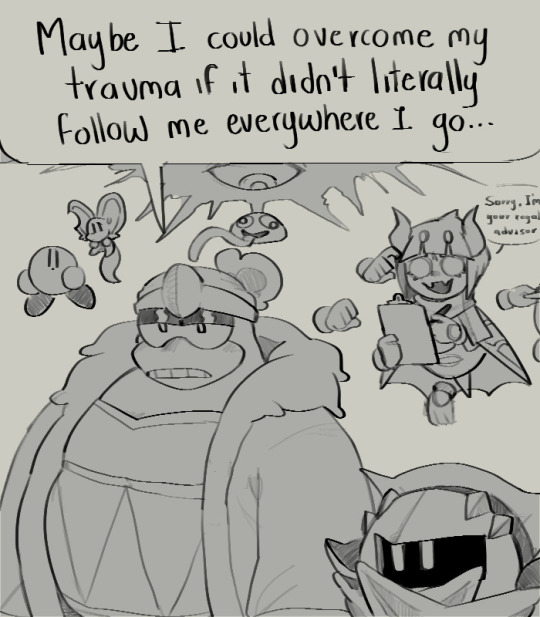
Dealing with Trauma while being King Dedede
Bonus:
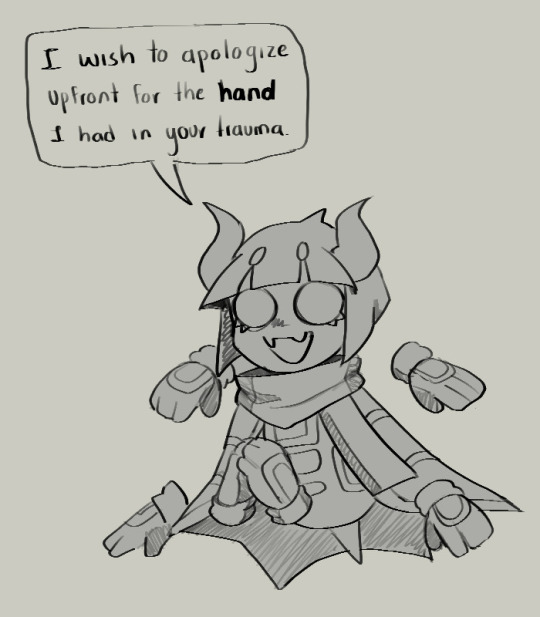
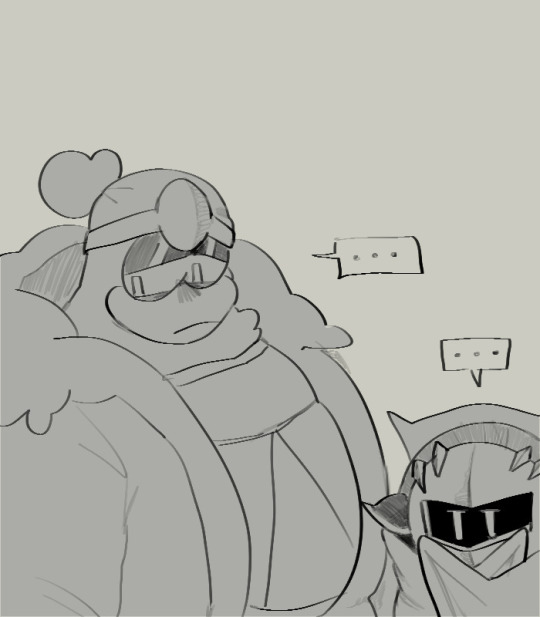
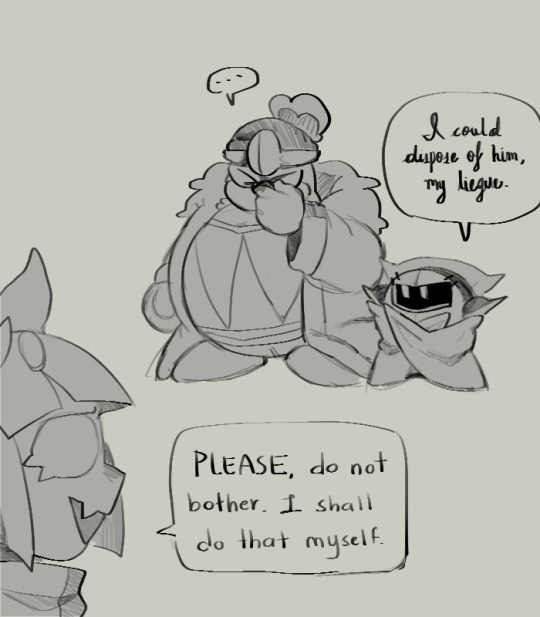
Dealing with Trauma while being Taranza
#kirby#kots#kirby of the stars#kirby fanart#taranza#king dedede#meta knight#elfilin#gooey kirby#dark matter kirby#meta knight can be counted as part of dedede's trauma for comedic effect#not every trauma he has is about being possessed guys#it's just unfortunate coincidental that most of it is#he isn't resentful of anyone really#but imagine having a deep seeded fear by trauma of insects and this fucker you call your friend is like 'thank god im a spider'#and you just have to deal with the technicalities#dedede lives such a sick and twisted life#originally taranza said 'beforehand i'd like to apologixe' but i thought it was overkilled#meta knight is not aware he's part of the problem#im sorry for not coloring anything this wont change
2K notes
·
View notes
Text
We all know the endless frustration of Garrus calibrating in ME2, but the whole situation just tugs at my heartstrings. Not just that he’s trying to keep busy to distract himself from grieving the incredible loss of his team, which he believes to be his fault by turian standards, but just:
“Shepard. Need me for something?” -> [hurriedly and dejectedly declines a personal conversation] -> “I’ll be here if you need me.”
That.
Something about the way he phrases it around need. It gives me the strong impression that he’s not just shutting himself down for his own sake so he doesn’t have to deal with messy grief and self-recrimination and burning, wounded anger before he can do something about it. He’s shutting himself down so he can work. He’s shutting himself down because once he starts actually grieving and processing, it’s over—his productivity, his clarity of mind, his usefulness to Shepard’s team on a suicide mission.
His usefulness to her, full stop.
Shepard has made clear from the start of their reacquaintance that she is depending on him. Someone I trust at my side. He’s got her six. His whole raison d’être, at this point, is to support her and be an asset to her mission. The only reason he is alive, right now, is because she needed him for her mission, and he knows it.
He will not let her down. Not like he let his team down—by ‘letting his feelings get in the way of his better judgment.’ He will not let it happen. He will be there if she needs him, he will be there to depend on, and he will operate as a repressed damn shell of himself in order to do that and be that person for her.
I’ll be here if you need me. Please don’t ask me how I’m doing because if you do, chances are I no longer can, and then what’s the point of me? But I’ll be here. You can depend on that.
And then there’s his action plan for Sidonis, and there’s a lot I could say about that would make this post way too long (turian society: living in service of the collective, the absolute taboo of ‘compromising your team,’ blame lying on the superior officer - and Garrus’ personal crusade: uncompromising justice) all of which play heavily into why he’s trying to execute the guy, but there might also be a note of efficiency in there.
One shot, and then it’s over, and he can be there fully for Shepard. One shot. One inhale, one squeezed trigger, and it’s done, and he can tie up the case and put all his energy into something else: their mission. It’s neat and clean… and not effective and bad for him in the long-term. He might not admit this to himself, and it might take a clear head to come to the conclusion, but the thing is—I’m not sure it matters to him. What matters is that he gets the affair dealt with swiftly so he can do his damn job. For Shepard.
Luckily for him, chances are that it does matter to Shepard. Because for all that he’s locked himself away, she sees him as a friend—or more. Because even when he’s turned her away every single time, she wants him to be better. Because she cares for him more than she cares about his usefulness.
#mass effect#garrus vakarian#shakarian#shepard x garrus#mass effect 2#milky.txt#been thinking about this for dayssss. hi emma#mass effect meta
369 notes
·
View notes
Text
I've been thinking about that last conversation with Garrus before the final push in ME3 a lot lately.
I hadn't noticed it at first because the whole conversation makes me so sad to think about, but recently I realized that if not for the apocalyptic dread, Garrus being the one to suggest retirement would actually be comical. since day one he's been a workaholic, going from the calibrating the Mako to calibrating the guns in the battery the second he's recruited. even in the Citadel DLC, drunk off his ass, he somehow finds a way to work. he couldn't retire; he'd absolutely die of boredom. and honestly? I don't know if Shepard would be able to retire all that easily either. pair that with his follow up comment of turian-human babies, and I realize that this whole conversation isn’t so much of a promise for the future as it is him throwing out his final hail mary. he's listing things that sound more improbable than defeating the reapers to get her back on track and believe in winning this war. maybe it could be "I want a life with you even though I don't think we're going to get one," but that isn't what he's trying to do.
because you see the destruction. to get TO Garrus, you had to walk past a radio reporting 100% casualties in one sector. you know it's bleak, Shepard knows, Garrus knows. it's clear neither of them think they're getting out of there. hell, the whole reason he tries to cheer her up is because he's the one who brought up last chances. so he does what he's been doing all game and throws his final attempt at cheer at her with all he's got. it's his final push.
#mass effect#shakarian#garrus vakarian#femshep#mass effect 3#hi it's me again blog with ladybug icon posting my weekly meta that probably has been beat into the ground before#thinking about shepard and garrus literally makes my stomach hurt. how do you guys live like this. I've only known them for like 6 months#been pacing my home thinking about this all week so hopefully now i'll slow down on writing meta actually and finish writing fics instead#okay void take this away from me#mostthoughts
367 notes
·
View notes
Text
okay hear me out. tlt animated adaptation BUT it starts with harrow the ninth. we have a desperate housewives-esque voiceover narration speaking in second person. the audience doesn’t know about anything that happened in gtn and doesn’t know that the “flashbacks” didn’t actually happen. first season ends with harrow finding palamedes in the river and the voiceover saying “you never could have guessed that he saw me.”
SECOND SEASON. we’re following the events that happen in gideon the ninth. there’s no more voiceover. nothing that happened in the first season is even mentioned. it’s not explicitly clear that we’ve gone back in time but it becomes more clear as the season progresses. lyctorhood wasn’t really fully explained in the first season either, but there were clues that become more obvious as the mystery unfolds. season ends pretty much exactly like the book ends, bringing us to the moment that the first season started.
THIRD SEASON. starts where the first season left off, follows the end of htn. Gideon desperate housewives voiceover is back.
fourth and fifth seasons would follow nona and alecto, obviously, but the format of them would have to be equally confusing and weird so I need to wait and see what alecto is like before I theorize on that.
or the show could just end after the events of harrow finishes and leave nothing wrapped up or explained. I honestly kind of like that better
#ofc they don’t necessarily have to be full SEASONS but I think the order of events has to go this way#for it to have the same mind-ruining effect#tlt#the locked tomb#locked tomb#tlt meta#gideon the ninth#harrow the ninth#nona the ninth#alecto the ninth
1K notes
·
View notes
Note
Please do more of of the super Robin!! Only if you want to, of course, but I really want to see more of everyone at the dinner, losing their minds while Tim, Kon, and Danny just bask in it. I especially want to see more of Alfred being sassy because that is the funniest part for me.
Somehow, Danny is not only half Kryptonian but also a meta-human. Tim may not have developed the gene; it was somewhere in his family tree- Tim personally thinks it's on his mother's side- that skipped the super genius and implanted itself into his son.
Tim detected the meta-gene while running basic tests on the clone when he was first created. He was still determining which of Danny's abilities were the meta part of himself since so many previous powers he has shown were Kryptonian.
Everyone was on high alert, waiting with barely held breath for Danny's powers to unlock. It made Kon a bit angsty, always watching his son with tight-rung tension whenever he tripped or stumbled.
Not that he was upset Danny was a meta, but he's seen plenty of meta's while in the field that usually caused such destruction because none were prepared for their powers. Especially since most meta's powers are unlocked under severe tension and life-threatening moments.
He wanted what was best for his boy. Tim, on the other hand, handled fatherhood in a more relaxed and snarky but loving point of view. Danny would randomly start flying through their house, with Kon walking underneath him in case he fell and shout, "To the stars, my spaceman!" while sipping coffee, finding it hilarious how his usually smug husband was reduced to a mother-hen.
Danny responded by making rocket ship sounds and soaring a little faster, and Kon fretted a bit more. Tim could spend the rest of his life watching them.
That didn't mean he would, seeing as life needed to move forward, and being a father didn't mean he stopped being Tim. They needed some time for being a couple as well.
This is why they contacted Tim's siblings to ask for a favor one weekend in late spring.
Dick had agreed to watch his nephew and littlest brother- Jarro- while Tim and Kon went on a romantic getaway weekend. It was a test run for the two men's honeymoon that was set to be in about six months, while also a chance for Danny to bond with his family.
Their elopement had been rather rushed, and Danny running around made it hard for them to actually have time as a couple after their marriage. Tim had created their child in a grief induce craze after all.
Kon insisted that Tim included every possible test result and likely meta-gene sighting in the binder they left that held everything Dick needed to know about Danny. It was a sizeable three-inch binder, organized by several tabs and sheets, which took Dick a whooping hour and a half to get through, but he will read every single sentence because he loves his nephew.
He's currently mid-way on "Passtime and approved hobbies." Kon had written five times that crime fighting and sneaking out to take photos was not child age-appropriate, but Tim added, "If he has an uncle or aunt with him, it's fine" in Parathas.
"Watch this!" Jarro crowed, springing in place before flinging himself across Dick's living room in a rapid side-ways spin. "Ninja-Star!
Danny cheered from the floor, jumping up and down. "Ninja-Star! Ninja-Jarro!"
Dick grins, taking a quick video to send to Damian with the words They want to be like you."
He gets back a rapid Naturaly
Despite being a one-word reply, he knows that his brother is beaming somewhere on Gotham Acadmey's open field.
"Ice-mage!" Danny yells suddenly. Dick snaps his head up from his phone at once. Usually, when kids scream nonsense like that, it's make-believe, but with these two, it was best to be safe than sorry.
Yup, ice is now covering every inch of his living room floor. He winces, and there goes his safety deposit. "Danny, where did the ice come from"
"Duh Uncle Dick, it's my ice magic!" Danny calls back, sliding across the floor with a giggle. Jarro rides on his head, one little limb stretched out as he war cries.
Dick fights the urge to sigh. "I know that, darling. I meant did you make it with your freeze breath or?"
"I made it like this." Danny does a strnge twirling of his fingers over eacother before a ice slide appears at the end of the couch. Danny climbs over the arm rest to reach it and slide down, with a burst of more giggles.
Dick nods, humming in the back of his throat as he flips the binder to the back page and pens in "Ice-based meta gene."
He pauses at the sight of Alfred's neat and perfect penmenship with the words "Density shifting- Young Master Danny flouted down into the cave to help me clean. He's very well-mannered, likely from his Kent side. Heaven knows he didn't inherent it from this family."
Dick winces even more. He can practically hear Alfred's accented No one helps me in this damn house. He should go over tonight to redo the Batcave's invintory and maybe shine up the Batcars.
"Uncle Dick, can we watch Frozen!?"
After an excellent movie with his baby brother and little nephew.
#dcxdpdabbles#dcxdp crossover#Super Robin#Part 2#Uncle Dick#Dick's pov#Danny is a meta human on his Dad's side#His Pa side has a lot less effect on him then they think#After all he looks the most like Tim#Fluff#Tim drake/Kon El
377 notes
·
View notes
Text
You know what I really appreciate about Kaidan's character arc? He gets a story about finding self-acceptance and letting himself let go and feel things - but at the same time, he still gets to be an introvert. He still gets to be, in his words, someone who isn't 'the life of the party, who has a lot of friends'.
I mean - in ME1, Kaidan fully admits to a romanced Shepard that he doesn't feel human. When he killed Vyrnnus, he became someone Rahna was afraid of, someone she saw as dangerous... so he holds himself to nigh-impossible standards. 'You never let yourself lose control,' Shepard tells him. He's very, very indirect in a lot of his conversations with Shep, because he's trying so hard not to be too direct, too forward; he's constantly polite and disciplined and professional because he can't be a problem. He can't let anyone see him as unpredictable or dangerous because that's when they start seeing you as terrifying. That's when people you love look at you like you're not human.
But Shepard can encourage him to let himself feel, and show it - 'I might need to loosen up. A little,' he admits, sheepishly - and when you see him again on Horizon, he lets his feelings be open and messy and a Problem. By ME3, he's completely embracing his nature as a biotic, gleefully letting everyone know at the Citadel party that he can Reave now, joining in with the other biotics roasting James in the 'biotics vs strength' argument. He's accepted himself, he knows his friends accept him, and he's letting himself laugh and drink and dance like a complete dork, and he's grown so much, and yet -
And yet, he's still a fundamentally quiet, self-contained person. Maybe I'm just jaded from all the media where introverted characters get told to loosen up, and then they suddenly realise that they do want to be the life of the party now actually. But Kaidan? Kaidan hangs out in the observation deck, perhaps the quietest part of the Normandy - the same place where Samara spent her time, a place where no other characters are present. (Ashley, in comparison, spends a lot of time hanging out in the bar, where there are constantly other characters around). Kaidan's Citadel hangout with Shepard? He doesn't head out onto the Silversun Strip with you like many of the other characters; his ideal evening is cooking a meal for his friend/partner and having a chill time with the two of you. A lot of the conversations you have with him on board ship are quiet, introspective. His hangout place on the Citadel is a quiet Presidium cafe.
It's just... comforting to me. He grows, but he doesn't have to change who he fundamentally is, y'know? ME3 Kaidan is more confident and sociable and (despite everything) happy than ME1 Kaidan, but he's still a guy who's not fond of too much lights or noise or crowds, who's soft-spoken and sensitive, who gets caught up in his own thoughts sometimes. I just really appreciate that.
2K notes
·
View notes
Text
I think a lot about Shepard's fish tank wipeout in the Citadel DLC.
The entire DLC is this lighthearted love letter to Mass Effect, and it's beautiful. But then there's THIS moment. When Shepard falls through a fish tank.
The entire way down, they desperately try to arrest their fall. They have no shields. No combat armor. There is no one to catch them. It feels like this is one of the few times there is ever fear. And they don't land gently. And the cut scene lingers on it. There is no levity in this moment. Shepard is on the ground, groaning in pain, slow to get up, clutching their ribs. First instinct before they try to get to their feet? Reach for the gun. Have that first. Then see if you can stand.
And I think the only reason we can have this moment, where Shepard is vulnerable, injured, and in trouble, is because there is no one there to see. The moment Brooks gets on the comm, they crack a joke. "Yup. Feeling good." While unable to stand up straight.
We get this at the end of the game, too, but that's when the stakes are at their highest. That's when it's supposed to be hard. It's no less magnificent then, but now, in this moment? When everything was happy and fun and silly? MAN.
And afterward, everyone jokes about it. Every single member of your squad makes a crack about the sushi place. And Shepard plays along. Haha, yeah, fell right through it, while trying to change the subject.
No one knows what that fall was like. No one saw Shepard lying on the ground in the bowls of the Silversun Strip, water dripping off them, struggling to get to their feet.
And no one asks, because it's Shepard.
#mass effect#commander shepard#i have a lot of feelings about this#mass effect meta#citadel dlc is the best dlc
5K notes
·
View notes
Note
do you happen to have that page that talks about the beauty standards of each race?
Yeah sure. While scavenging pics for this I found this neat reddit compilation & chart & theory talk too. I had um, way more to say than I anticipated (I know you only wanted the one page. I have nothing to say for myself. Like most topics in Dunmeshi things snowball because they’re so interconnected. Mercy…) so, many races and observations are only mentioned near the bottom.
Beauty standards and race in Dungeon Meshi
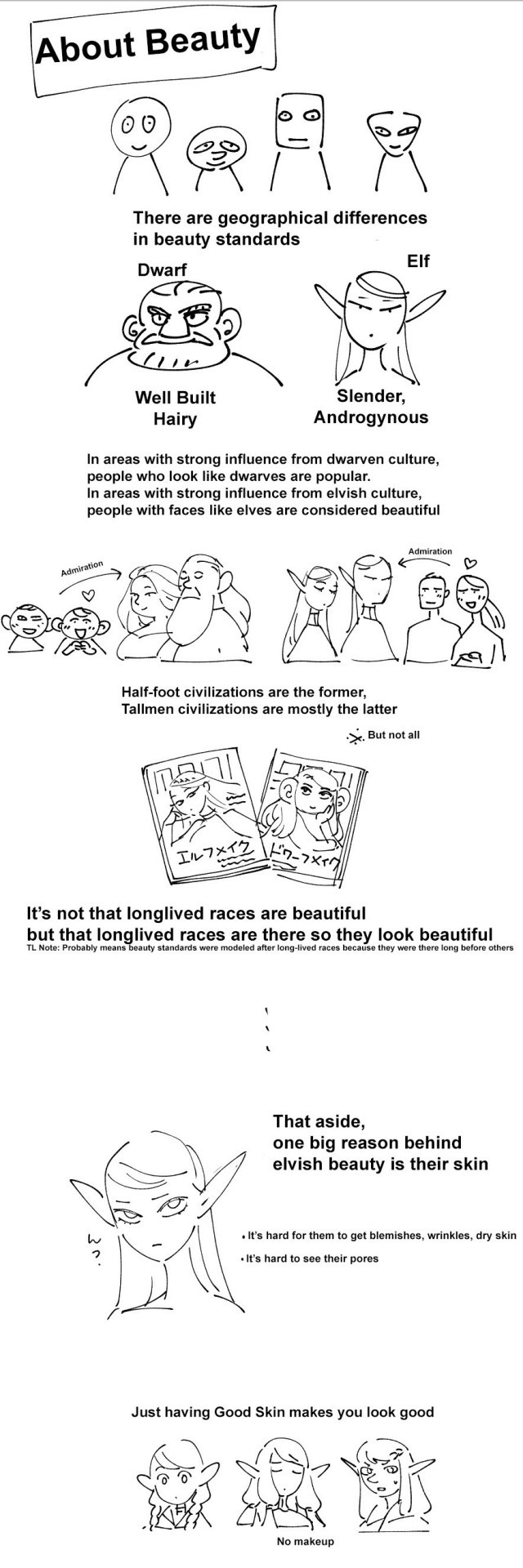

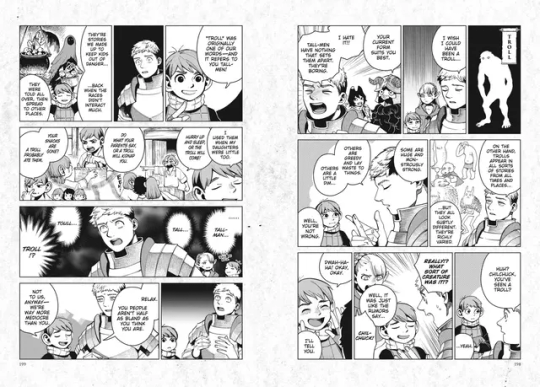
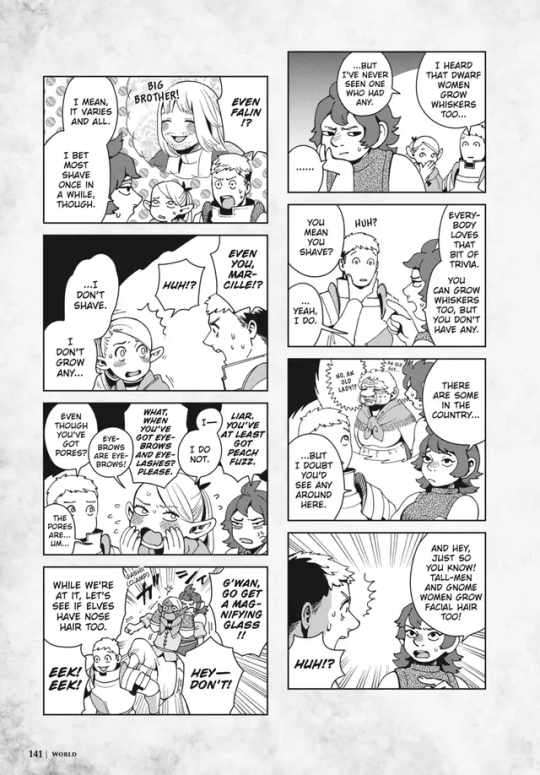
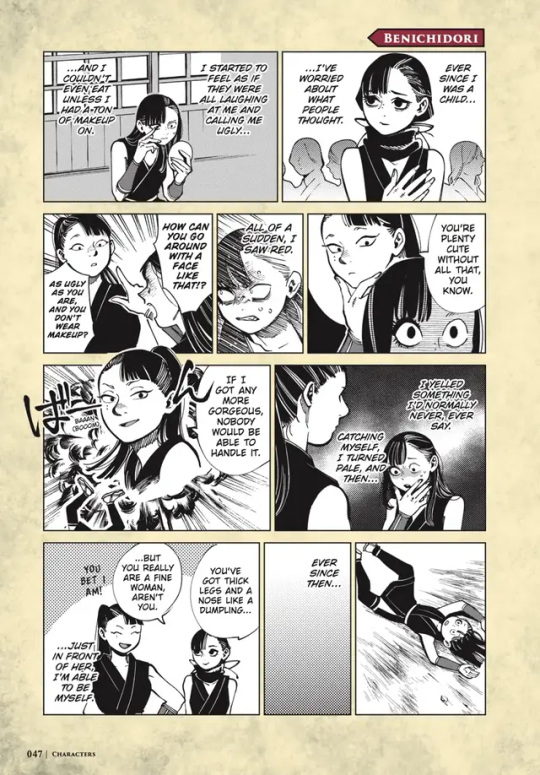

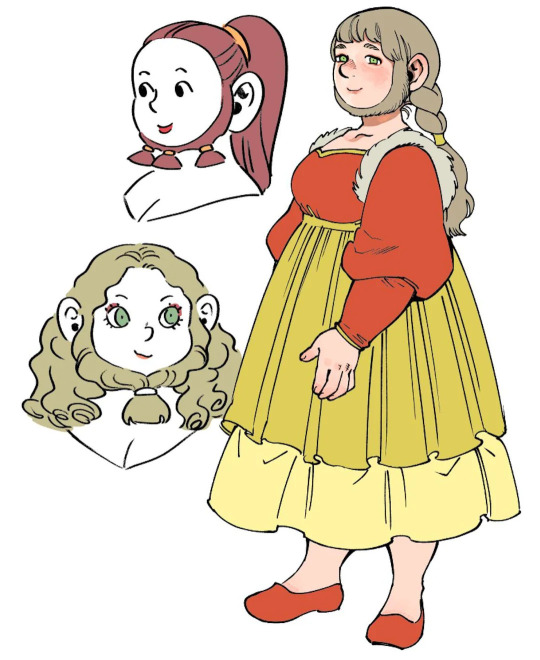
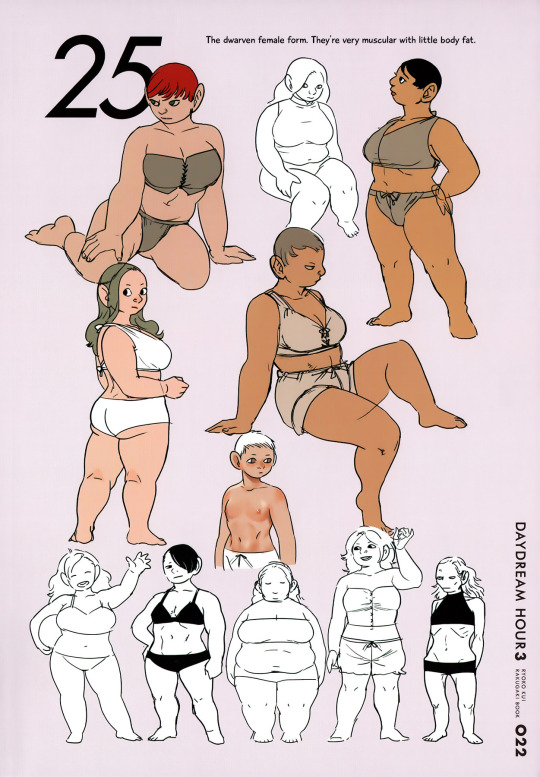
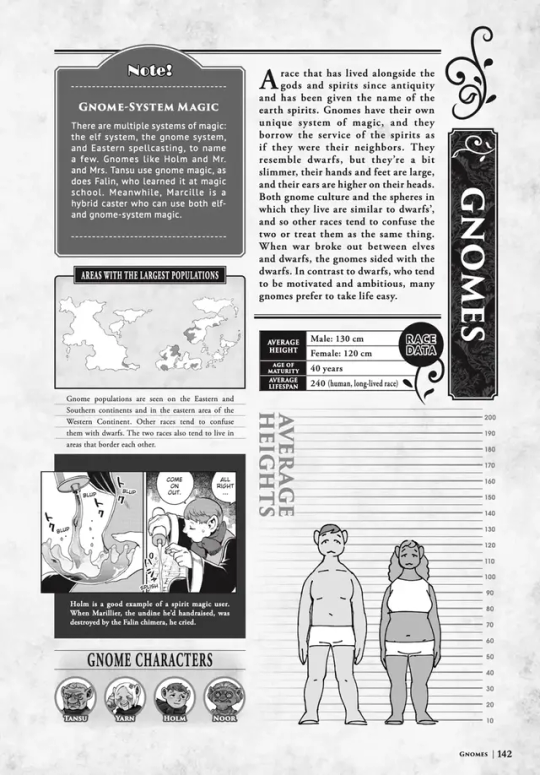

Not pictured there’s also how elven society is harsh on visibly disabled people, and how the demon took away Mithrun’s silver eyes and ears to take away his pride. There’s also how Senshi might have fit in with the orcs more easily because of the dwarven wide body shape, and how they tend to have more body hair too I suppose. In the extra on orcs we see Senshi living with the orcs and he gets judged because of the hierarchy rather than his looks.
What is fashionable also differs from culture to culture, and there’s how tattoos only seem common with elves, though dwarves and others do also sometimes have some. They seem to not raise much brows, which makes sense since for many essentially they’re for professional (magical) purposes especially with elves. Gender roles also differ in type and importance, but generally they are similar to irl ones for the races we see. Elven society seems to be the least gendered, which would be an unsurprising logical outcome of having lesser sexual dimorphism aka they look more androgynous. Comparing fashions and gender roles and how they affect beauty standards would be a whole other compilation and conversation. Kui has great worldbuilding partially because she’s got such a good grasp on sociopolitics and geopolitics. History affects cultures and beauty standards greatly. Kui’s oneshot Distant Utopia was very eye opening on her way to worldbuild and the consideration she gives these things, I do really recommend reading it.
Out of the big 5, we know the least about gnomes, but their sheet does say both culture and region are similar to dwarves’ and they end up being confused together often, so we can imagine the beauty standards are similar to dwarves’ as well.
I wanted to touch on this in a post eventually, but how one daydream hour page said half-foots tended to be curvaceous like in the artwork below puzzled me for a long time, all the half-foot characters we see during canon are rather slender and lanky after all, Chil’s succubi also being more curvy than plump. Economics are for sure a factor in that I imagine, the half-foots characters we see are all implied to be some flavor of poor or malnourished, as are half-foots depicted as empoverished oppressed minorities in general. Even comparing the artwork with the half-foot sheet’s depicted average half-foot, the ones on the left seem bigger. Wouldn’t it make sense though, if unlike dwarves half-foots don’t have similar naturally wide bodies, yet due to idolizing dwarves they work towards having a similar body shape/type to emulate them?
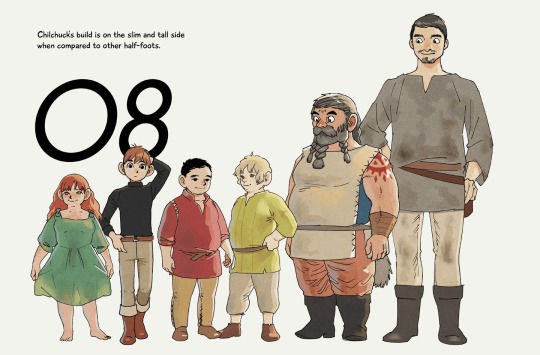
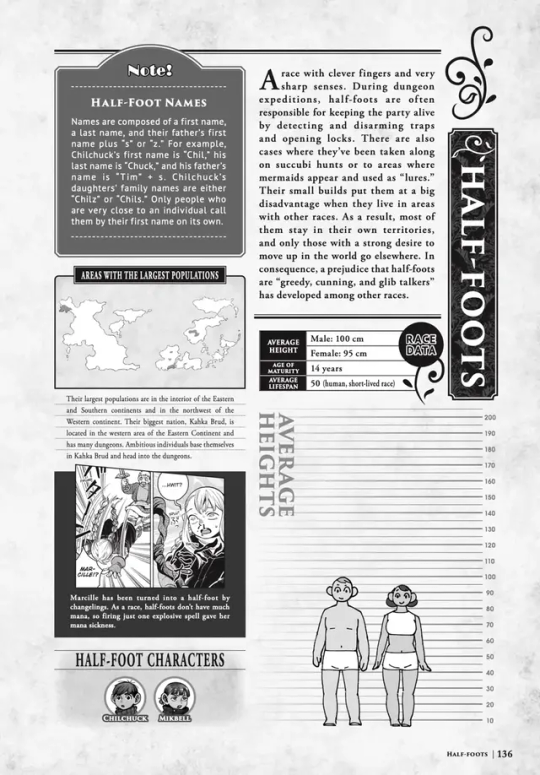
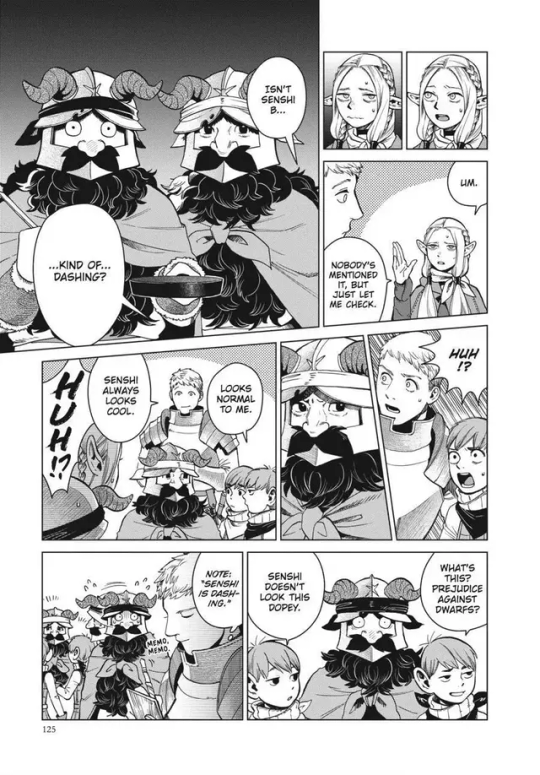
It’s said half-foots tend to stick to pretty ethnically homogeneous regions (aka half-foots-only communities) unless they move to the big city with ambition to try and make it big (like Chilchuck and his wife & kids did), and that’s interesting imo because then that would mean that in a ton of half-foot communities, they rarely see or interact with dwarves whom they try to emulate. Of course, one thing about beauty standards is that when they get adopted, at one point it stops being "this is how dwarves look and so this is how half-foots should look" and just becomes "this is how half-foots should look", most people feel as though beauty standards aren’t learned but innate, so I figure the half-foots wouldn’t have any problem still seeking dwarvish traits when there are no dwarves around.
There’s also stuff you can glean here and there if you want to extrapolate more. Like how in the race swap artworks, Mickbell is only smiling in the dwarf portrait, and Rin’s elven portrait looks very close to her elven one- Rin who is stated to be beautiful in her profile blurb. Benichidori’s extra does teach us tallmen can definitely have harsh beauty standards, but also since the text portrays her as very dysmorphic that’s likely reflected in her thoughts to a much more intense degree than is common, not an accurate strict baseline to go off. Ah, Kabru’s blue eyes are also why he and his mother lived a rough life in Kabru’s hometown, but that seems to be regional. Good post here on the topic of Kabru’s blue eyes and ties to irl history. There’s a lot to be said about Kabru being a man that in many ways is close to elven beauty standards, and how that might have affected or been affected by his upbringing with elves + his persona as someone that can effortlessly charm most people. Marcille’s section here in this essay also goes into Marcille’s struggles to fit in with the ideal image of an elf.

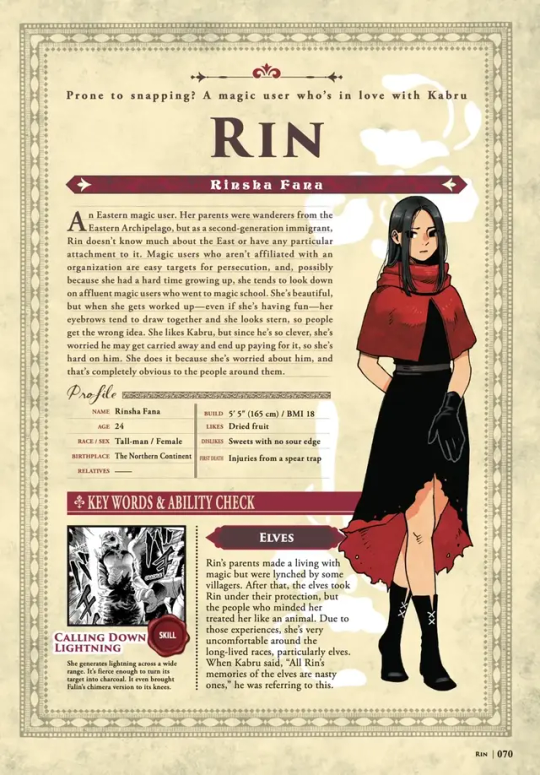
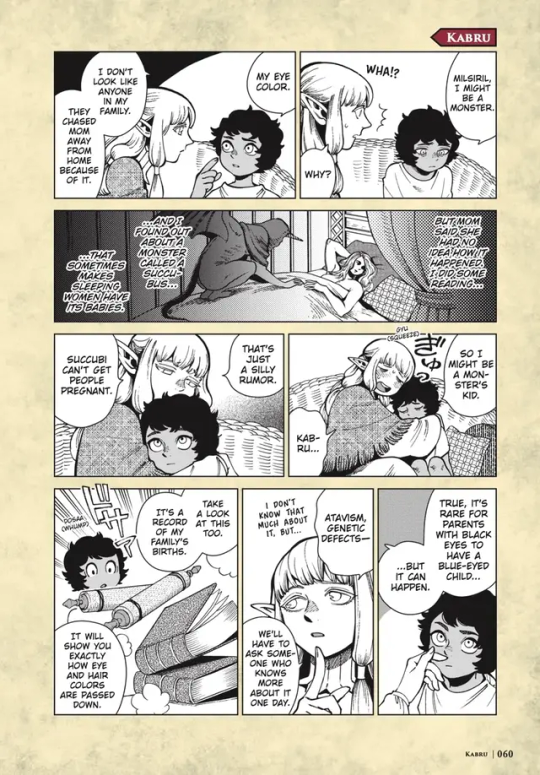
Looking human
Also notable are beastkins and demihumans: Demihumans are all dehumanized which makes people treat them worse. So if you differ from the visual idea of "human" (an in-world subjective categorizatiom just as much as demihuman is) most people do judge you negatively. Elves and dwarves get to fight about which type of human is considered the prettiest, but demihumans are below tallmen and half-foots, they are considered as simply below the beauty contest, incompatible with it.
Onis are perhaps the demihuman people we know of with the least cultural influence on the dunmeshi world, and with less intensely different appearances than other demihumans, but even them are treated as lesser than human, treated as beasts to slain for reputation points or useful strength to have around and command. It’s said their "magnificient horns" and fangs are often shaven off when the oni lives in tallman towns, so you could easily make the argument that onis are denied the right to have their own beauty standards, having to conform to other people’s and going through mutilation to take away features they might otherwise have taken pride in. Inutade was bought by the Nakamotos from a dangerous sumo fighting ring that got one of Inutade’s tooth broken on her first and only fight. Remember when I said different fashions existed in dunmeshi and how those could also affect beauty standatds? Like the elves, if you look at the portraits pages that include a lot of characters that aren’t in the story you can see distinct cultures within the same races, for example one young elf is bald which is in sharp contrast with usual elven long luscious hairstyles, and that’s especially true for onis I think. Maybe not only from different regions but different eras as well… They have a bit of population in the very north of the western continent, so I like to think some of the ogres live in very cold, maybe even subarctic conditions. The point I’m getting at here is that within a race, culture/ethnicity like with Kabru as well will also influence them, different communities will have differing beauty standards. The oni history blurb and third row first collumn portrait remind me of Mongolia (which historically was a lot of different nomadic communities with different cultural identities as well. Something something, the oni empire experienced a decline and then tallmen overpowered them, and now they’re governed and split apart by stronger social classes & slavers and the richness of culture was hurt for it), but obviously many of them are dressed and look rather japanese, makes sense considering living in/close to Wa, and first row second collumn portrait reminds me of ainus which again would be logical considering geographical placement, though I’m far from an expert. Interestingly, ainus are indigenous people both in Japan and Russia- Perhaps the northern western continent ogres are meant to be closer to Russia than Canada like I imagined? Ok tangent over.

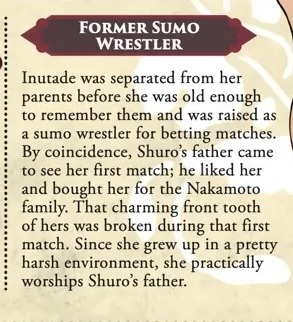

The kobold sheet says they’re especially sought after as slaves because they’re "adorable", but locally in the western continent they’re repeatedly said to be seen more as ferocious and dangerous. The dehumanization is most apparent in the first comic below. The language barrier and conflicts no doubt worsen this by a lot, but I think it’d be hard to deny that their canine appearance makes the dehumanization worse. "They’re ferocious beasts, they’re demihumans, they can’t be communicated with". Most characters in Dungeon Meshi’s world are desensitized to slavery and most characters are prejudiced one way or another. Point being, kobolds are fully removed from human beauty standards, but no doubt for kobolds, other kobolds are more beautiful than humans are. They’re assumed to be an uncivilized bunch, but just like any other people they like to aforn themselves with nice clothes and jewelry and keep themselves clean and groomed; they too take care of their appearance and take pride in it.

And the orcs! This one we have the most contact with in canon, with not only there being foreigner characters from the ethnicity or hearsay of their homelands and culture but full on contact with a community. We get to see up close what they’re like and what they think, and of course in turn they’re our introduction to how demihumans are harshly looked down upon and seen as inferior, less human and thus less worth valuing and less dignified. It’s text that orcs are ugly to most humans and humans are ugly to most orcs. Since I judged they didn’t need accompanying explanation the pictures showing this are in the pictures dump at the top.
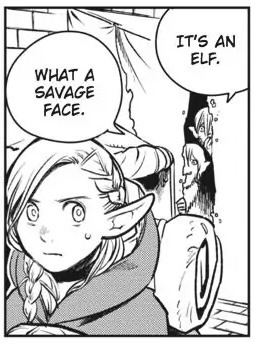
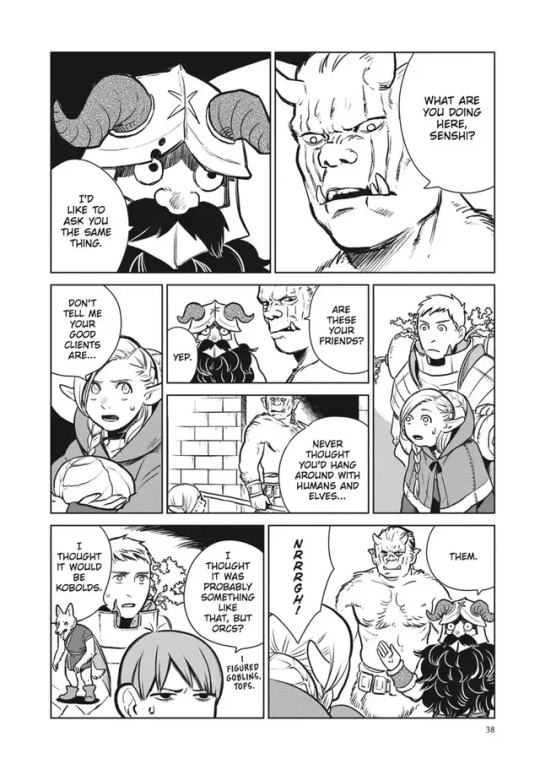
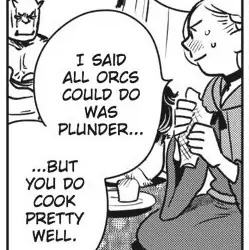
God forbid you sell vegetables to orcs my god- but then again they do basically mandate adventurers to kill any orcs they come across so yeah the world isn’t above that even a bit.
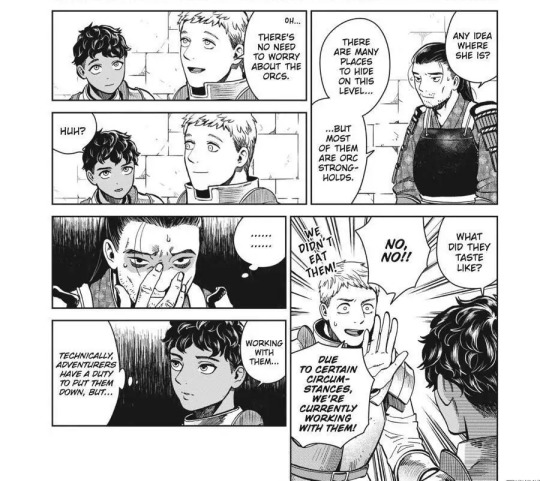
So yes, my main point here is simply that orcs are yet another evidence of the physical ideal of "human" being an important beauty standard for human societies globally.
Izutsumi is our glimpse at how beastkins are treated in the world, and in Wa at least that’s ending up being caged and mistreated as part of a freak show. Izutsumi hates her appearance and wishes she could leave the feline part of herself behind to only be human. Interestingly, not that we have a lot of info on them so this is very much a take with a grain of salt situation, but there seems to be less stigma around artificial beastmen, those who can shapeshift at will. The main difference is of course appearance, that most of the time they simply look like average tattooed humans. Artificially creating humans is an illegal practice, and no doubt it’s not well regarded, but being able to hide that makes them less likely to be discriminated at any moment, or even just discriminated less intensely. Again, looking human is important, not only for belonging but for safety’s sake. Beauty standards rule the world with harsh hands.
Mermaids and fishmen
Ok we’re done now right? Right-! But wait… Wait…! Mermaids and fishmen are said to be demihumans too, special separate cases to the main three demihuman species however, which is also represented by how mermaids and fishmen both are in the Adventurer’s Bible chapter Monsters meanwhile ogres, kobolds and orcs are in the chapter World. They’re an interesting topic because they directly tackle this topic, not only in a meta way for the readers but also making characters themselves struggle to quantify their humanity with the goal of knowing wether they should be eaten or not, especially Chilchuck. Chilchuck’s "is it really just a matter of feelings?" mini arc.
The party asking themselves "Should we eat this?" is very common, and often they end up playing a little loose on morality, like eating the red dragon’s meat despite it having digested Falin. Not unsimilarly Marcille freaks out a little over the vegetables they harvested having been grown with fertilizer, aka largely human poo. Half of the motivation of "should we eat this perhaps sentient creature" is out of consideration and compassion, but more strongly and more often, the characters struggle with a sense of taboo at eating something too closely related to humans. Even, feel uncomfortable because of the deepseated impression that eating it would dirty them in some way. Cannibalism is an interesting and relevant topic in many ways, but what I want to mention is how there’s the more or less universal belief that committing cannibalism inherently taints you as a person and turns you more monstrous, morally but also literally depending on some myths such as w*ndigos and onis in some cases, like in Touge Oni. Marcille and Izutsumi both express a fear of eating monsters turning them monstrous. Maybe this is part of what Laios was hoping for, honestly. There are two fears here, if eating a demihuman monster constitutes as cannibalism or not, and so, will eating it taint you because it’s a human, or will eating it taint you because it’s a monster? You are what you eat, until it’s a little too literal. You morally are the means by which you get your food, and you physically are the result of your nutrition. Dungeon meshi manages to mix an exploration of humanity with the theme of food because our relationship to food is very deep and complex, psychological as much as physiological.

In the end, the characters sort of shrug and accept that they’ll never quite understand the world of mermaids and fishmen and how they operate, and what that means about them. Laios is the one always challenging these notions other characters take for granted, it’s not obvious to Laios why people are softer on mammals than other animals and plants, it’s not obvious to Laios why people would be afraid of eating a monster just because it’s a monster, it’s not obvious to Laios why some food is gross to Marcille but not fish testicles, it’s not obvious to Laios why you should immediately regard orcs and kobolds badly.
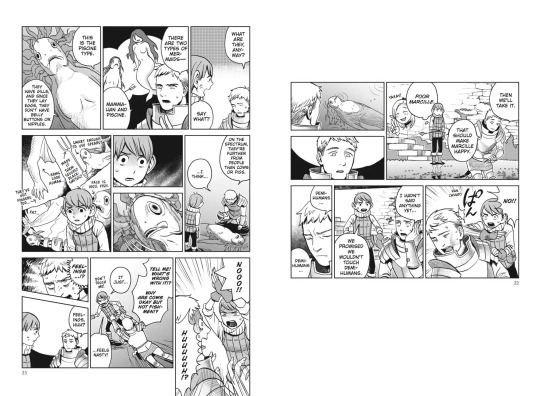
"Cows are probably closer to humans [aka closer to being human] than fishmen, though they’re clearly intelligent", dehumanization to lessen empathy towards them to be able to eat them. Meanwhile, mermaids seemingly have a less noticeable "civilization" or intelligence, they hunt in groups like fishmen, but they don’t use tools and such, they feel more primal and similarly instinct driven, and yet… Do they attract sympathy more? Mammals, humans, is it because of their nature or because of their appearance?
Both the nature and appearance of fish are ones people don’t typically sympathize with. "Fish don’t feel pain", "goldfish only have 5 seconds of memory", "it’s okay to keep fish in completely empty bowls too small for them until they die from it", so many lies and misconceptions exist that make people less considerate of them. The average lifespan of a goldfish is 10-15 years, the record is 43, but they’re not seen as lives that really matter, so a lot of goldfish die in a few weeks of bad aquarium conditions. There’s a lot of research on animals evolving to look cute and appealing to make some predators want to kill them less and parents want to care for them more, including humans. First good google research result gave me this credible short article on the topic. In Chilchuck’s weighing wether a fishman is far enough from being human or not to eat, "face is 100% fish" is his biggest argument for it being more acceptable. The face, the most important thing for empathy and recognition. The face, the decapitated fishman one that falls into his hands next chapter.
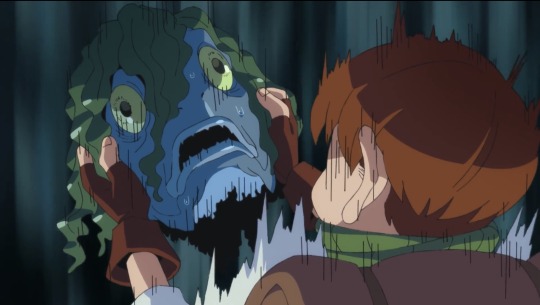

To quote @room-surprise: "Chilchuck can't explain why it's wrong to eat the merpeople, even though it's NOT complicated. But the problem is Chilchuck would have to accept and acknowledge that the merpeople might be people? And that's outside of the worldview he passively believes, so he can't just say that, because he doesn't think that's true. But that IS why he "feels" it's wrong. And it's all you'd need to say for Laios to understand! But it would require acknowledging that maybe the way they're treating and talking about the merpeople is wrong."
The idea of Chil not being able to grapple with how maybe some monsters are more humans than they seem, him who had been an advocate of half-foots rights, half-foots who get undermined and treated as inconsequential sacrifices… Grappling with how he could relate to the merpeople’s situation almost, and pulling away because it’s so existentially horrifying. I do not want to see myself into an hostile fish-faced warrior I can’t communicate with. In a way this also relates to Chilchuck being the only party member who doesn’t see Izutsumi as a cat in the relationship chart, the only one to treat her with full human dignity. He knows the struggle to be taken seriously, he knows being infantilized and he knows what it’s like to be treated as less than human.
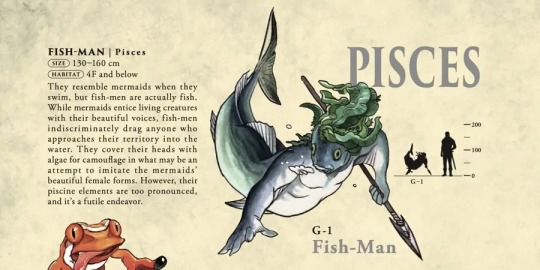
Below, you will see Chilchuck draws the line of where they become not okay to eat as when "they already look like mermaids". Above, there’s speculation that the algae hair is partly to mimic "the mermaids’ beautiful female form". Is it because mermaids are their enemies and the ambiguity might give them extra seconds to attack or flee? Is it to trick adventurers instead? It’s striking to me that this is what works, with the adventurers. Sure the fishmen are intelligent, but explicitly here, what makes them no longer acceptable prey to Chilchuck is that they look close enough to a mermaid, close enough to human. Mermaids who of course themselves have this form to entice and seduce and charm the adventurers they prey on. Chilchuck considers the intelligence due to the tridents, but most of his internal debate centers around their appearance, and the image of a fishman skewered sickens him. The power of mimicry… Mimic being a beautiful human woman. Mimic being cute, babies being wired to make us feel protective and softened. Half-foots, sometimes pretending to be children for scams or help or avoiding trouble.
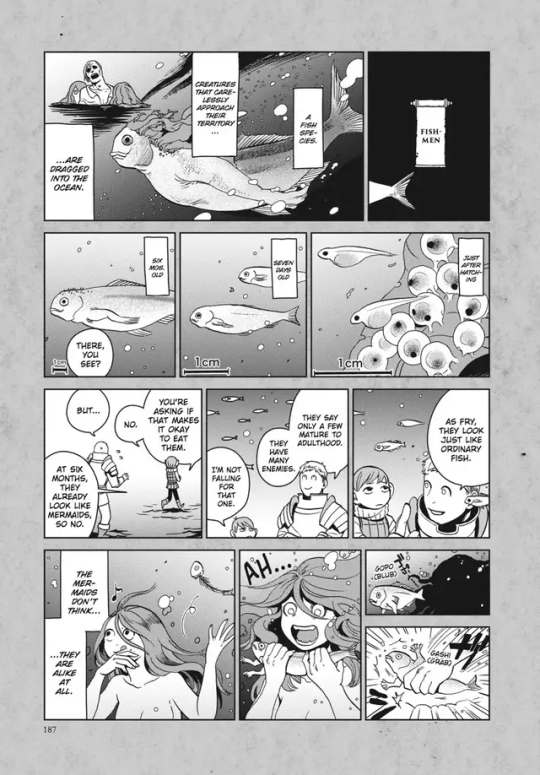
The mermaids are only concerned by their differences and not their similarities, and have no trouble treating the fishmen as food rather than peers. To an outside perspective like us, the audience, all these categorization of "more human" and "less human" between onis and orcs and elves and tallmen etc seem stupid and unfounded, but to the people living in Dungeon Meshi’s world, elves may as well be mermaids while onis are fishmen, not alike at all, unworthy of empathy and thus fine to eat.
Ultimately, Dungeon Meshi promotes unity. It’s about seeking to understand the unknown and the misunderstood, the dehumanized and the inhuman. It shows the good that comes from seeking to understand what you do not, even when that’s one another.
#Dungeon meshi#dunmeshi lore#Compilation#Ok… I think I didn’t forget anything. Feel free to point things out or discuss in comments and tags though#Delicious in dungeon#Ik i strayed a bit from the central topic but who knew beauty standards and discrimination went hand in hand /s#Ask me about my dunmeshi kobold oc……….. ask me about my dunmeshi ocs……..#Can we give body neutrality an amen#Tw racism#cw racism#The “what are you talking about Marcille. Senshi is handsome” gag has 2 layers then doesn’t it#Like obvi Marcille is noticing the difference between shapeshifter and og senshi rather than making a judgement#But the elf being *the* one to notice and say “Senshi looks more handsome than usual that’s weird??” may very well be an effect of living#with elven beauty standards yeah#Meta#I wanted to make a post on the half-foots body type thing and the oni mongolian coding and the chilchuck merman thing so#Three in one 🎵 why take the initiative when you can just wait for the tiniest opportunity#Chilchuck tims#Analysis#dunmeshi fishmen#It’s very interesting to think of how there being so many people *that* physically different affects politics and beauty standards#Mimics…. Pacing my room. Pondering. Mimics………#The burnout is over yippee#Ok but for reals though race is largely a social construct. Critical race theory good. Go read Distant Utopia by Ryoko Kui#‘Yeah sure.’ < person who thought she’d just be grabbing like 3 pics and had no clue she’d become hyperfocused for hours#The classic societal obsession for classifying and exaggerating physical traits into boxes of innate goodness vs evil…
239 notes
·
View notes
Text
There are a couple more Garrus-Vakarian-related hills I'm willing to die on.
Maybe this particular bit of fanon has faded over the years, but there used to be a lot of insistence that Garrus is young and somehow inexperienced when he meets Shepard. Canon doesn't really support this. Turians start their mandatory service at 15. Garrus has at least a decade of experience. Even if he's 2-4 of years younger than Shepard (according to Patrick Weekes), he's got at least as much field experience as she does by dint of the difference in turian and human "enlistment" ages.
Garrus is really damn good at his job at C-Sec. You don't give the Case of Investigating the Rogue Spectre to a greenhorn. You give it to your best, most tenacious agent. Pallin may not always approve of Garrus's actions, but that doesn't actually stop him from putting Garrus on the tough case. Also, we don't know much about how C-Sec works but we do know a bit about how the turian hierarchy works, and we know C-Sec was essentially a turian initiative. That means it's a meritocracy where failure reflects on the superior, not the one who failed. So, in roughly a decade (Shepard's 29 in ME1; I always think of Garrus as about 27), Garrus has not only done shipboard military service, but he's also risen to be one of C-Sec's top investigators; Pallin wouldn't risk having Garrus's "failure" reflect poorly on HIM otherwise. I'd say that actually makes Garrus as remarkable in civilian law enforcement terms as Shepard is considered to be within the ranks of the Alliance military.
Of course Garrus was scouted by the Spectre program. And honestly, if his dad hadn't stepped in, I think Garrus would have become a Spectre, no problem. Especially for a turian, he's cut from precisely the cloth the Spectres would be looking for: extremely skilled, extremely capable, and--most importantly--he's a turian not just able but willing to work outside the chains of command that turians are taught from birth to revere and be loyal to above all else. This is the reason Pallin is leery about Spectres: he's a good turian. Good turians follow straight lines; they don't carve out their own paths.
Garrus's dad's not dumb, and he's not cruel, and he, too, rose to the top of the C-Sec hierarchy. He took one look at his kid, I think, and said, "I love my child, but I'd say it's a 50-50 chance he ends up a shooting-first-asking-questions-later Spectre like Saren Arterius, and I don't want to see that happen." Yeah, he uses his parental influence to try and jam square-peg-Garrus into round-hole-C-Sec and Garrus resents him for it, but there's no way he did it just to stop his son from getting his way or because he doesn't like Spectres. I expect Vakarian Sr. had to clean up more post-Spectre-interference messes than we can possibly imagine. But we also know he and Alec Ryder were pals later.
So the importance of what Garrus learns from a Paragon Spectre Shepard is this: You can't just do what you want and claim the ends always justify the means. That's what Saren does. Over and over again. Garrus's code and his idealism and his sense of justice and his ability to work alone should make him a great Spectre, actually, but he needs Paragon Spectre Shepard's actions to show him the lesson he tells her he's learned during ME1: "If the people I'm sworn to protect can't trust me... well, then I don't deserve to be the one protecting them." (And the seed of Archangel was planted.) I think for the first time he realizes that even though he believes his sense of justice to be correct, it doesn't matter for shit if he can't show others why that's so. And that's where the trust comes in. (Also, ow, the extra level of importance this gives their exchange where she tells him she trusts him and he tells her she's about the only friend he has left is... a lot. Cool, cool. I'm totally fine. Nothing to see here.)
When Shepard asks him what happened on Omega, he replies, "My feelings got in the way of my better judgement." Something tells me that this never happens to "good" turians, which just makes the line so much more devastating. And although the lesson some might take away from this is "feelings bad; no feelings ever," the "grey" that Garrus has to learn to deal with is precisely the grey of recognizing feelings, validating them even, but not acting on them until they've been examined. (Which is why my Shepard stands between him and Sidonis; she doesn't give a shit about Sidonis. But Garrus has refused to process his own feelings of failure and self-loathing, so they have to take the therapy session to the Citadel and deal with it there.)
Ahh yes. The mountain range of character analysis.
#mass effect#garrus vakarian#femshep#paragon shepard#thinky thoughts#mass effect meta#long text post#i have no idea if i'm repeating things i wrote about more than a decade ago but oh well lol#october is for talking about mass effect i guess#happy birthday month to me
459 notes
·
View notes
Text
De-aged and injured Danny
Danny is found out by his parents. They don't take it well.
Clockwork is very upset about this, because he'd gambled on almost-certain odds of them being chill about it. So now he has to run damage-control before this very unlikely time-line goes even further off the deep end.
Unfortunately, Danny needs to be in the living world, not the Infinite Realms. Which means that Clockwork needs to put Danny somewhere safe. Somewhere where nobody will find him.
And double-unfortunately, the only place that remotely fits this bill is to contact Lady Gotham.
City-spirits aren't... super-reliable. They're Neverborns who very very rarely consider "humanoid shapes" worth figuring out. So they just kind of... exist. An ectoplasmic presence that's undeniable, but also extremely difficult to have a conversation with.
Thankfully, Lady Gotham is (for all of her... quirks) generally very hero-aligned. Which is why she's the best one to ask for sanctuary for Danny.
Danny who Clockwork de-aged as a way to "limit his injuries" of being vivisected.
Lady Gotham agrees, but she only has one "safe place" to put him. And her Knight is a little bit too paranoid for her to just dump an injured child in his lair, without causing more trouble than it's worth.
But it's hardly a difficult thing, to arrange a few things, and place Danny in a spot where his injuries will cause her Knight to hurry to his aid.
Such as... in a room filled with medical equipment, right next door to where Joker has just lost a fight with Batman.
Things escalate somewhat when Batman finds him and makes some assumptions about what Joker has been up to. Tempers run a bit high, someone loses a few extra teeth, someone else has to physically drag Bruce off Joker's body before he beats him to death, and the Joker considers the whole thing a grand old laugh (he has no idea what's going on, but it sure pissed off Batty, and that's always a treat).
Of course, the Batfam has to actually investigate the scene, evacuate Danny, give Danny medical aid, and then also ask Danny about what happened.
Danny wakes up and is very confused about a lot of things.
He's no longer being vivisected. Great. Love that part.
He's somewhere he doesn't recognize (the Batcave). Could be good, could be bad. At least the bed is pretty nice?
He's very small. This feels like a personal attack. He might not have gotten a good growth-spurt yet, but taking away what he had is cruel and unusual.
And there's a weirdo in an... armored bat-costume? Who isn't setting off his ghost-sense? What the hell kind of "normal" person wears something like that?
Still, Danny does answer the questions that Batman asks him, because... well, there's a green post-it-note in his pocket that says he shouldn't lie.
So Danny tells Batman about his parents cutting him up "for science". And Batman hears that the Joker somehow managed to hire two mad scientists who (upon the tiniest bit of suggestion from the Joker, who'd definitely seen the similarities between Danny and Jason and thought it would be a "funny prank") had leapt at the opportunity to vivisect their own son.
This is definitely worrying, because from the phrasing, they'd been "wanting to do it for a long time". And considering Danny's slow heartbeat and low body-temperature? They'd been wanting to do it because he was a meta.
So, somewhere out there (the Bats had found no trace of the two) were two deranged lunatics who wanted to cut open metas to "see how they worked".
Batman does the very reasonable thing and actually contacts the rest of the Justice League with their descriptions, just in case they'd managed to leave Gotham before the Bats had tracked them down.
#danny might mention the anti-ecto acts. which would lead them to the GIW which would lead them to Amity Park and to the Fentons.#and would likely stir up a LOT of outrage for a bunch of politicians effectively creating a loophole in a very clear-cut humanitarian law#(the meta-protection acts). and those politicians would probably be very nervous about having gotten caught.#(think about all the cool ecto-tech they could use to make tons and tons of money. as long as ecto-entities don't have any rights)#also also. upon investigating amity park in person? jazz would probably witness against her parents on the spot. no questions asked.#like. she comes home. and danny is gone? her parents are talking about ghost-kidnapping? and now someone official is asking questions?#yes. please. please arrest my parents and tell me where my little brother is. tell me he's safe. tell me he isn't buried somewhere.#jazz is very aware of the risks of her parents ''reacting badly'' to the phantom-reveal. which is why she's been covering for him.#but yes. this is mostly written out as a ''and here is de-aged and traumatized danny in batfam-custody''-setting idea.#bcs involving LadyGotham is fine. but having her TALK to her bats? communicate clearly? make her presence known?#never. she'd refuse on principle. she'd rather stage an arkham-breakout and indirectly murder thousands.#it's her love-language. you wouldn't understand.#laughing#my writing#danny phantom#dc comics#batman#stories
237 notes
·
View notes
Text
I keep flip-flopping on whether I like Liara's change in characterization post-ME1. Was she changed exclusively by the devs/writers so that she could be an action girl, which is considered more interesting/sexier? Was it a side-effect of her being put on the "everyone is now an edgelord" train? Or did it actually make sense?
At the present I'm inclined to think it's a mix of the last two. At the start of ME, she says that she's barely an adult by asari standards, that her work isn't taken very seriously due to her young age. We overhear, in ME2, an asari on Illium say that she's 60, so she's finally moved out of her parents' house. I'd say this makes Liara's 106 years around the equivalent of early to mid twenties. She suddenly finds her mother, an extremely well-respected woman in her society, betraying her people and going off with a rogue man who's rallying one of the galaxy's boogeymen to work for him, hunting down and killing innocents, turning them into monsters. Then, when she's gone to hunt her down to stop her, she finds out she's indoctrinated, that she set out to stop Saren, not join him. Benezia finds her mind for a few minutes, tells her she truth of the indoctrination, and attacks her and the person she's falling in love with (her first love, too!) only to die in front of her.
Whether Shepard rejects her or not, it's clear that she's in love with them, that her feelings are still there when the collectors attack the Normandy. And right then, she sees another person important to her, at best a friend and at worst a lover, die in front of her. She finds out there's a race to get their dead body, that it can be given to their murderer, or to a terrorist organization. She chooses, for better or worse, the second, the one who, as she says on ME2, gives her some hope. She admits to Shepard that her feelings got the best of her in that case. After dying for the cause, she sees their reputation be torn to shreds and every discovery they made be buried by politicians.
She loses Feron, another ally, another friend.
So yes, she changes. She's a 23 year old who went from exploring 50 thousand year old dig sites to being in the center of a belic conflict with her mother as an enemy. She sees her love die a horrible death, choking on nothing in front of her.
Of course she becomes obsessive and single-minded. Of course she adopts some of Benezia's worse traits. Of course she hunts down the shadow broker with such ruthlessness. And of course her behavior softens with Shepard - they came back. She's not stupid, I'm sure she knows her gamble, when she gave Shepard's body to Cerberus, was not without its dangers. She knows Shepard could rightfully be mad at her. She knows Shepard could have not come back at all! But she did it all anyway. Regardless of how her behavior can be seen as creepy or morally wrong, I can see where she's coming from, and I don't think she's all that wrong for feeling the way she felt. She stops being the saint she was on the SR1, but she's not an evil witch, and she's definitely not even among the top 5 squad members who needs the most atonement. Or jail time.
#[joker voice] this is just my opinion though#liara t'soni#mass effect#mass effect meta#shiara#her breakdown in me3 after the attack on thessia is for another post#because its not a matter of liara's characterization but of asari culture imo.#ania speaks#txt
197 notes
·
View notes
Text
me and den @unloneliest were just talking about murderbot and ART's relationship and i want to discuss how they quite literally complete each other's sensory and emotional experience of the world!!
there's a few great posts on here such as this one about how murderbot uses drones to fully and properly experience the world around it (it also accesses security cameras/other systems for this same purpose). but i haven't seen anyone so far talk about how once MB stops working for the company and consequently doesn't have a hubsystem/secsystem to connect to anymore (which for its entire existence up to that point had been how it was used to interacting with its environment/doing its job), after it meets ART, ART starts to fill that gap.
ART gives MB access to more cameras, systems, and information archives than it would normally be able to connect with while MB is on its own outside of ART's... body(? lol), but also directly gives MB access to its own cameras, drones, archives, facilities, and processing space. additionally, so much of ART's function is dedicated to analysis, lateral thinking, and logical reasoning, and it not only uses those skills in service of reaching murderbot's goals, it teaches murderbot how to use those same skills. (ART might be a bit of an asshole about how it does this, but that doesn't negate just how much it does for murderbot for no reason other than it's bored/interested in MB as an individual.)
we all love goofing about how artificial condition can basically be boiled down to "two robots in a trench coat trying to get through a job interview" (which is entirely accurate tbh) but that's also such a great example of ART fulfilling the role of both murderbot's "hubsystem" and "secsystem", allowing it to fully experience its environment/ succeed in its goals. ART provides MB with crucial information, context, and constructive criticism, and uses its significant processing power to act as MB's backup and support system while they work together.
from ART's side of things, we get a very explicit explanation of how it needs the context of murderbot's emotional reactions to media in order to fully understand and experience the media as intended. it tried to watch media with its humans, and it didn't completely understand just by studying their reactions. but when it's in a feed connection with murderbot, who isn't human but has human neural tissue, ART is finally able to thoroughly process the emotional aspects of media (side note, once it actually understands the emotional stakes in a way that makes sense for it, it's so frightened by the possibility of the fictional ship/crew in worldhoppers being catastrophically injured or killed that it makes murderbot pause for a significant amount of time before it feels prepared to go on. like!! ART really fucking loves its crew, that is all).
looking at things further from ART's perspective: its relationship with murderbot is ostensibly the very first relationship it's been able to establish with not only someone outside of its crew, but also with any construct at all. while ART loves its crew very much (see previous point re: being so so scared for the fate of the fictional crew of worldhoppers), it never had a choice in forming relationships with them. it was quite literally programmed to build those relationships with its crew and students. ART loves its function, its job, and nearly all of the humans that spend time inside of it, but its relationship with murderbot is the first time it's able to choose to make a new friend. that new friend is also someone who, due to its partial machine intelligence, is able to understand and know ART on a whole other level of intimacy that humans simply aren't capable of. (that part goes for murderbot, too, obviously; ART is its first actual friend outside of the presaux team, and its first bot friend ever.)
and because murderbot is murderbot, and not a "nice/polite to ART most of the time" human, this is also one of the first times that ART gets real feedback from a friend about the ways that its actions impact others. after the whole situation in network effect, when the truth of the kidnapping comes to light and murderbot hides in the bathroom refusing to talk to ART (and admittedly ART doesn't handle this well lol) - ART is forced to confront that despite it making the only call it felt able to make in that horrifying situation, despite it thinking that that was the right call, its actions hurt murderbot, and several other humans were caught in the crossfire. what's most scary to ART in that moment is the idea that murderbot might never forgive it, might never want to talk to it again. it's already so attached to this friendship, so concerned with murderbot's wellbeing, that the thought of that friendship being over because of its own behavior is terrifying. (to me, this almost mirrors murderbot's complete emotional collapse when it thinks that ART has been killed. the other more overt mirror is ART fully intending on bombing the colony to get murderbot back.)
in den's words, they both increase the other's capacity to feel: ART by acting as a part of murderbot's sensory system, and murderbot by acting as a means by which ART can access emotion. they love one another so much they would do pretty much anything to keep each other safe/avenge each other, but what's more, they unequivocally make each other more whole.
#the murderbot diaries#murderbot#asshole research transport#network effect#mine#idk what else to tag lol#BIG thanks to den unloneliest for helping so much with the drafting/editing of this!!!#we both were having some brain fog issues yesterday so we joked that with our combined forces we can make one (1) post lol#just like mb and ART fr!!!!#anyway im so fucking emotional over themmmmm#murderbot meta#the murderbot diaries meta
701 notes
·
View notes